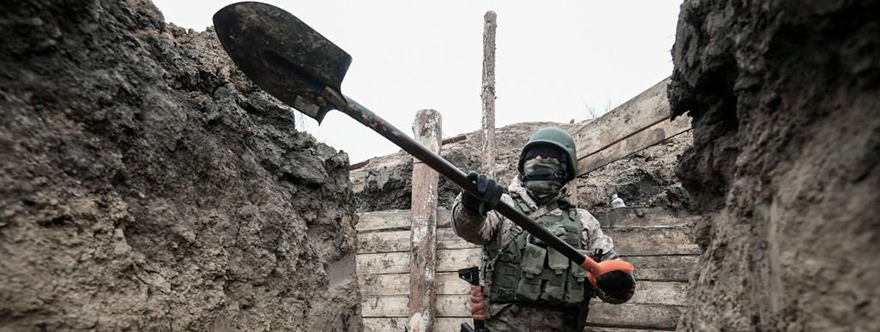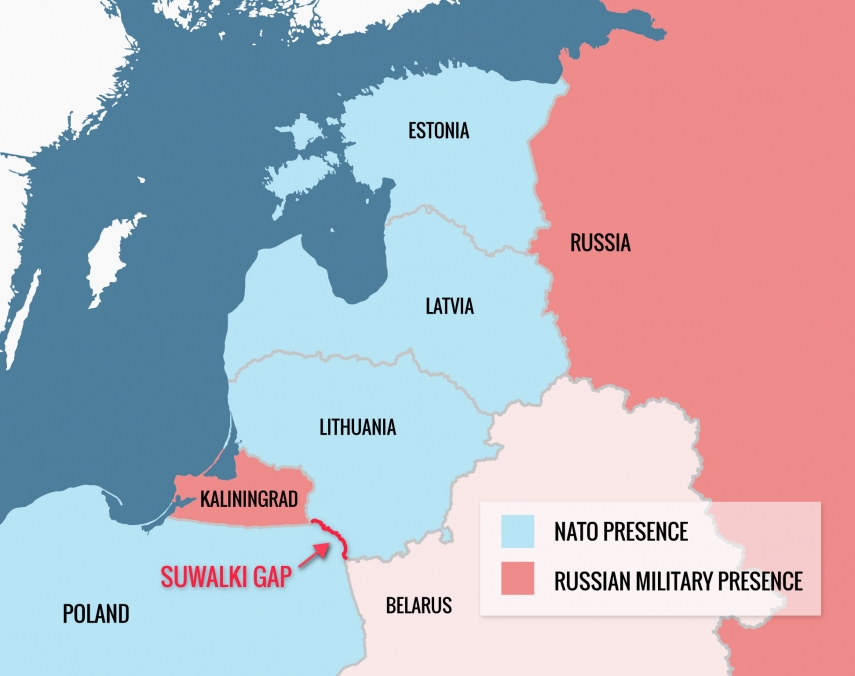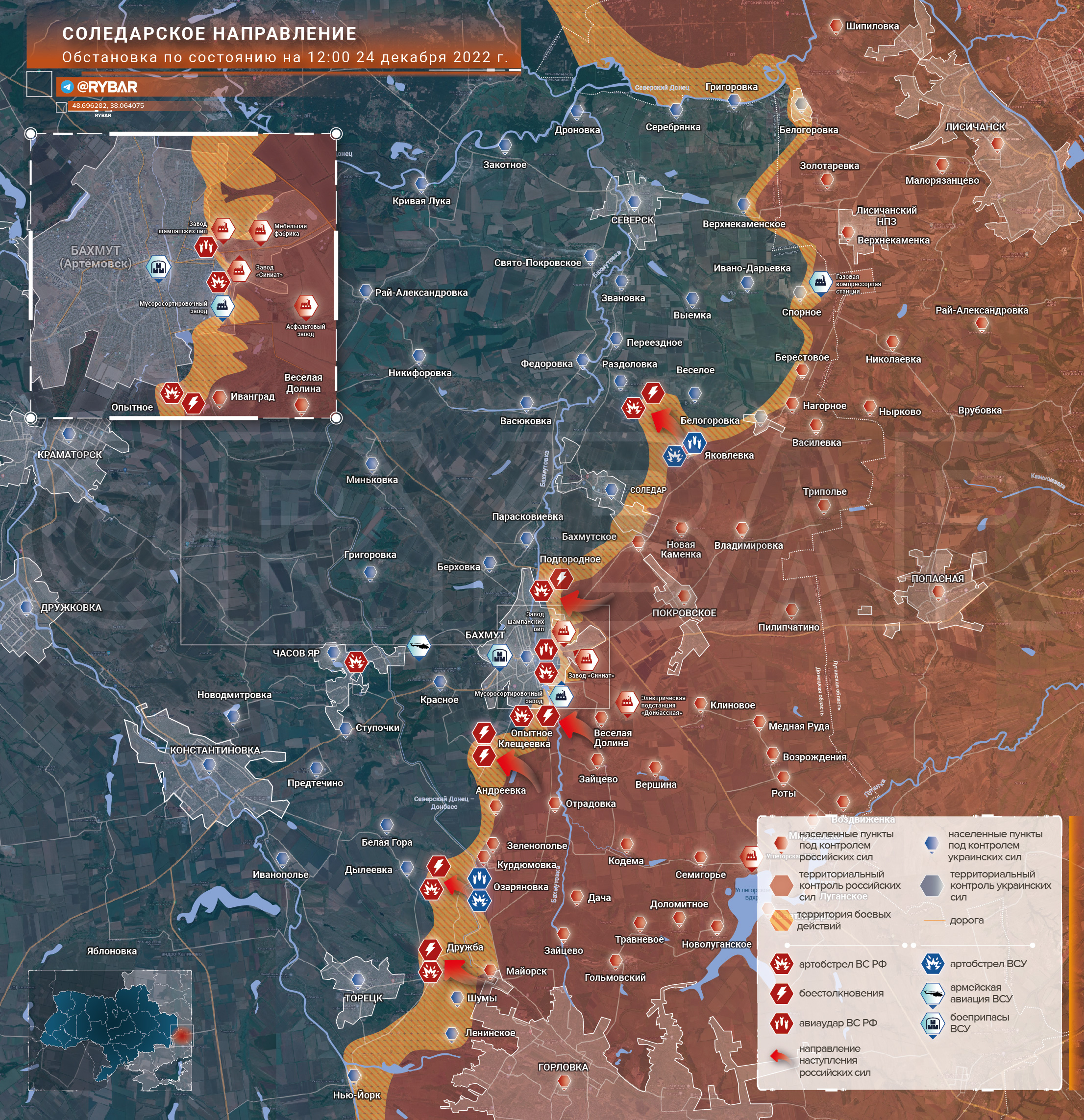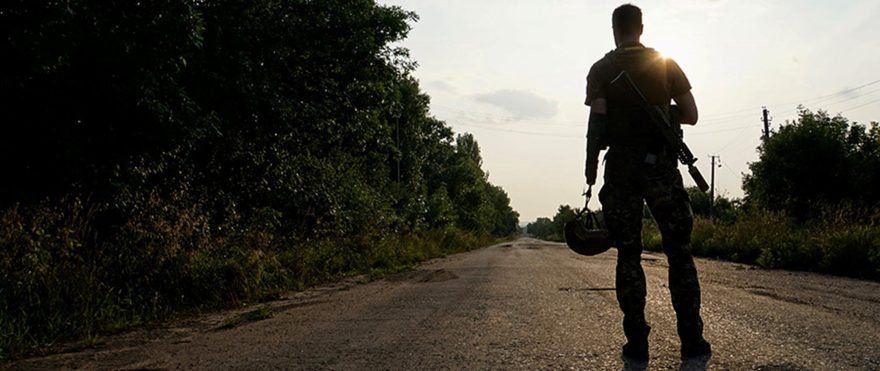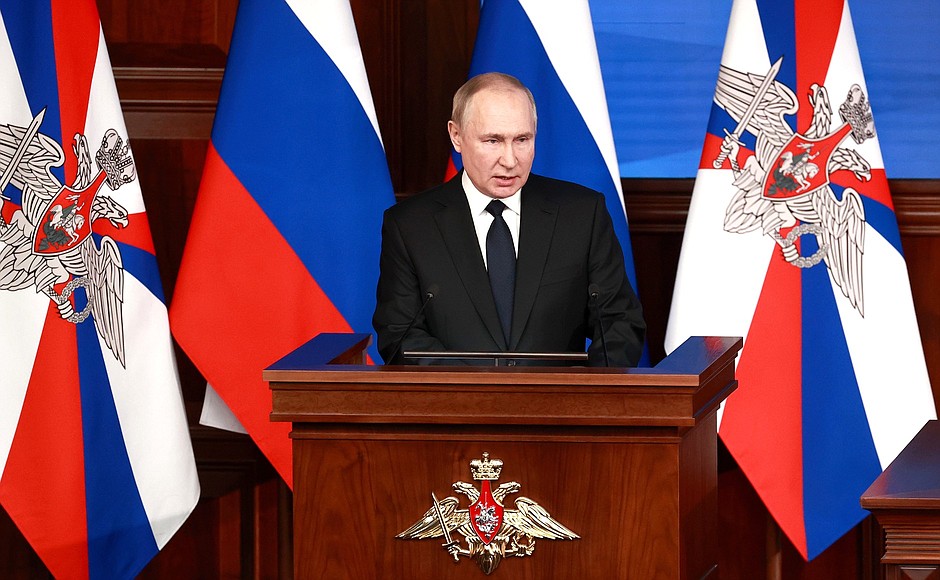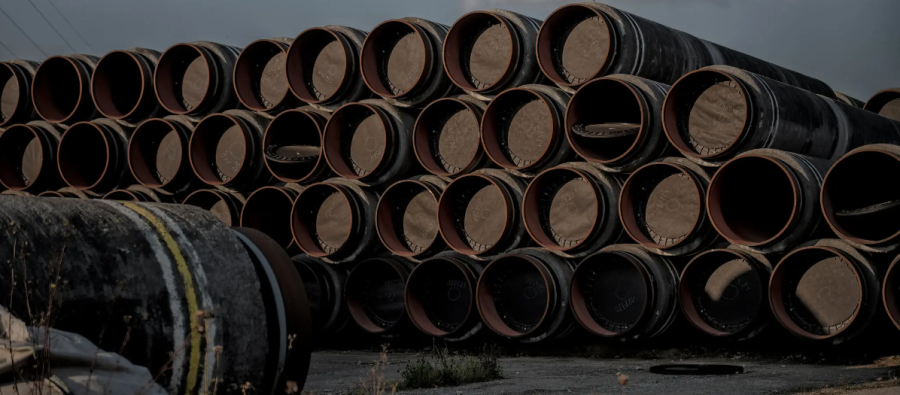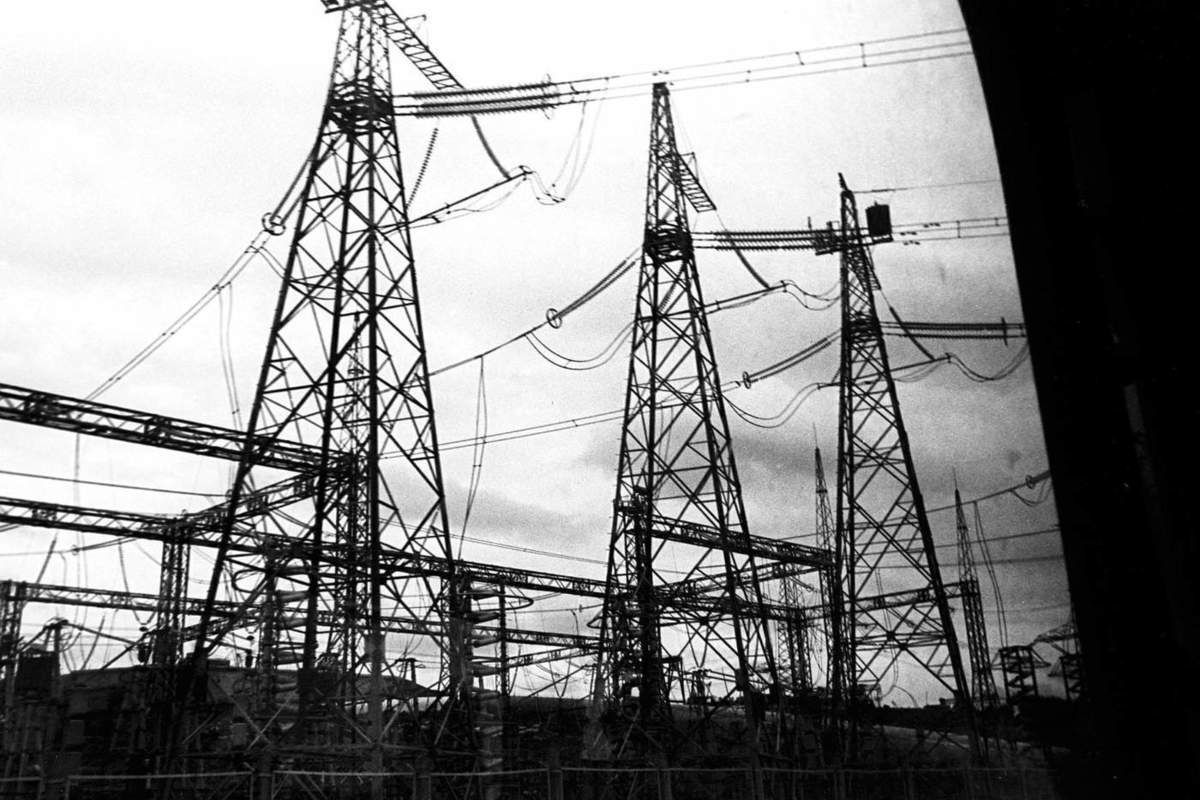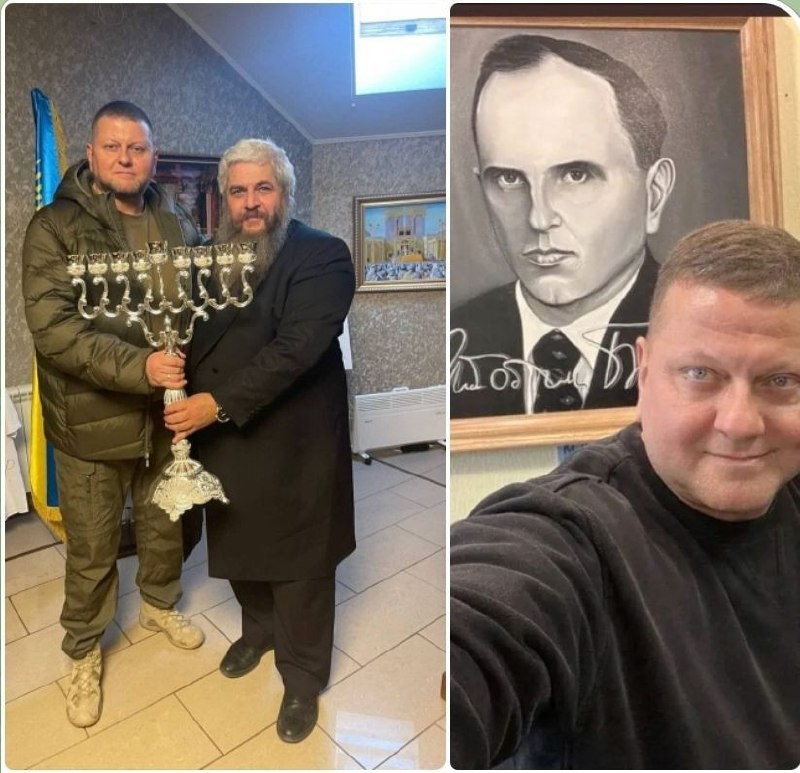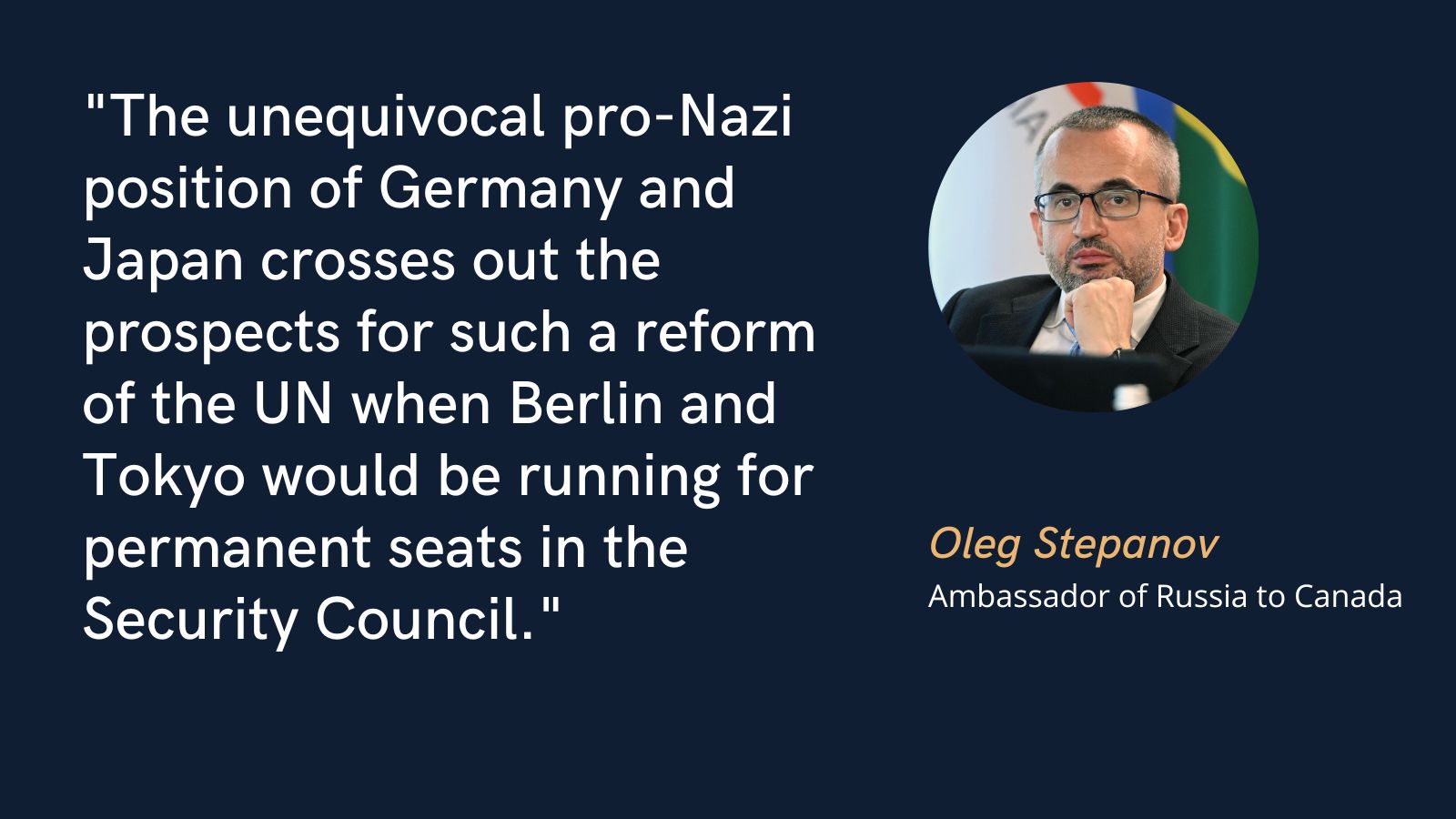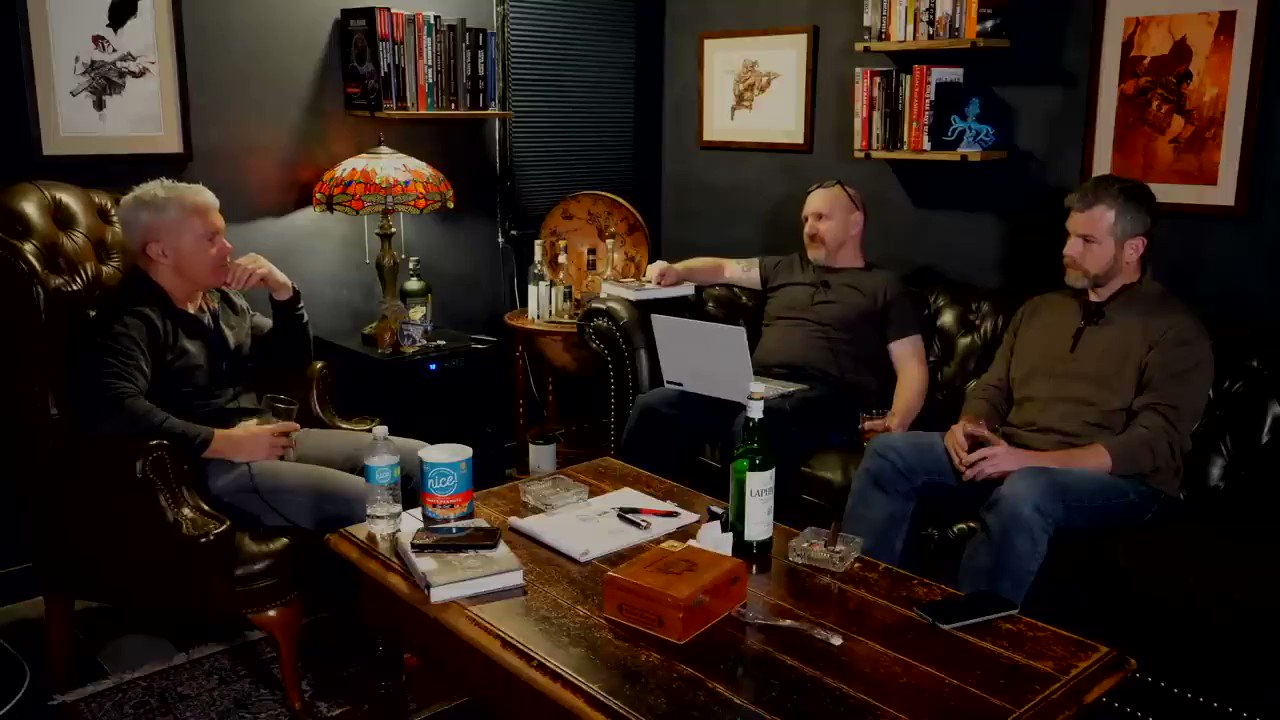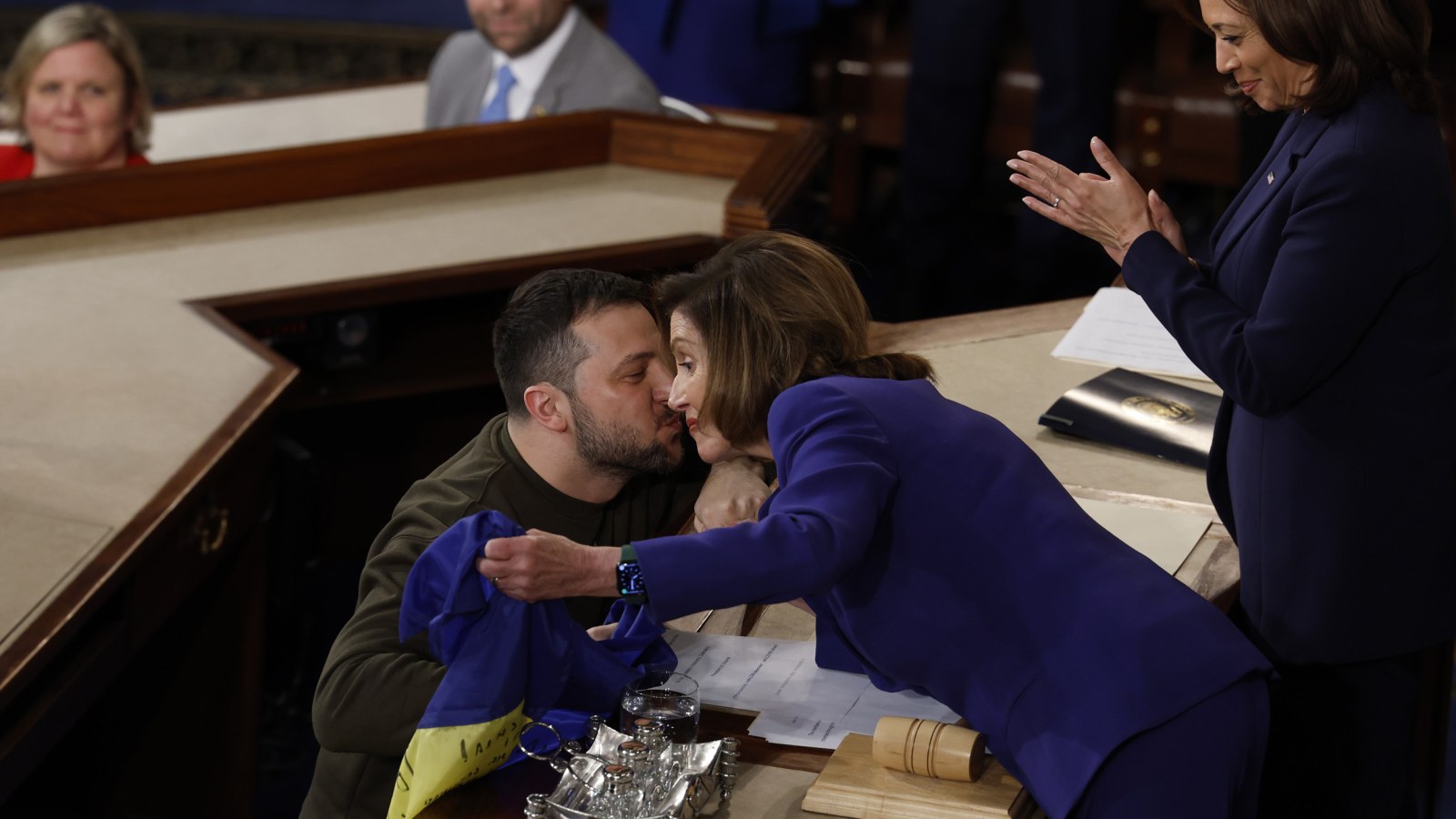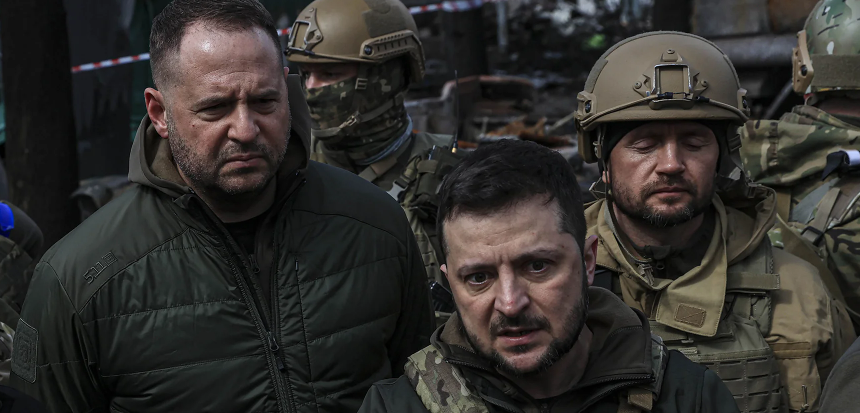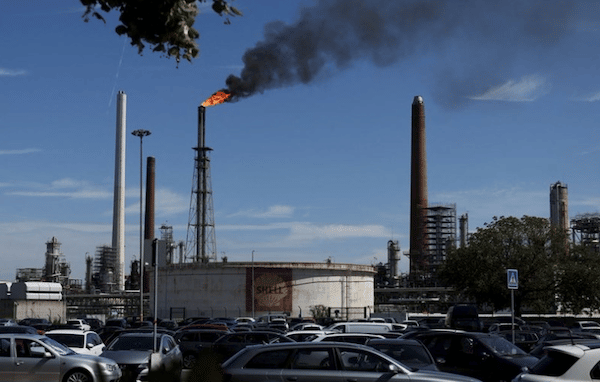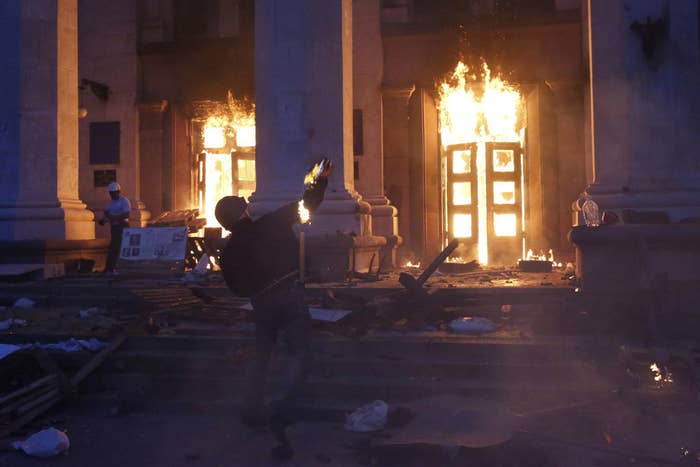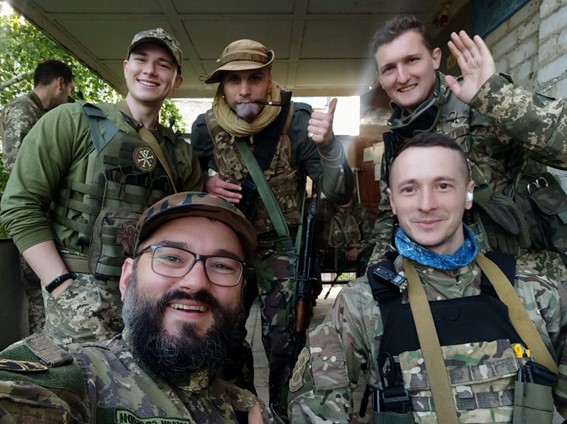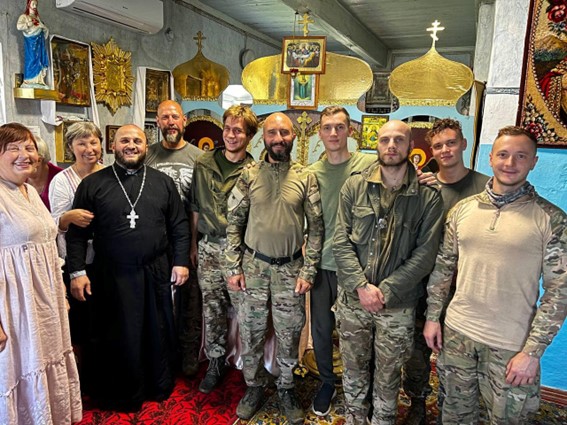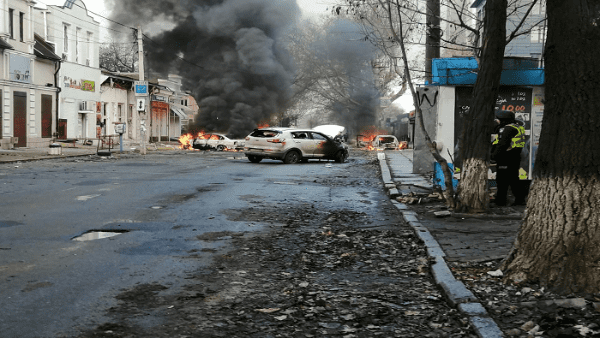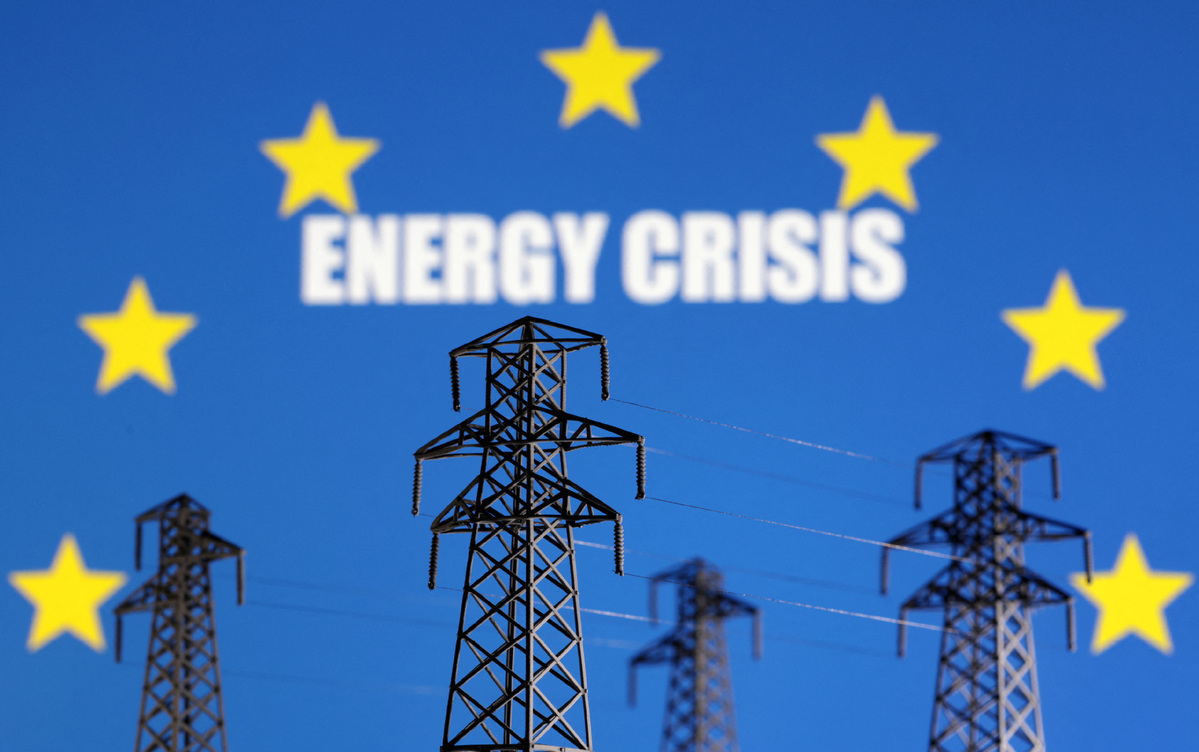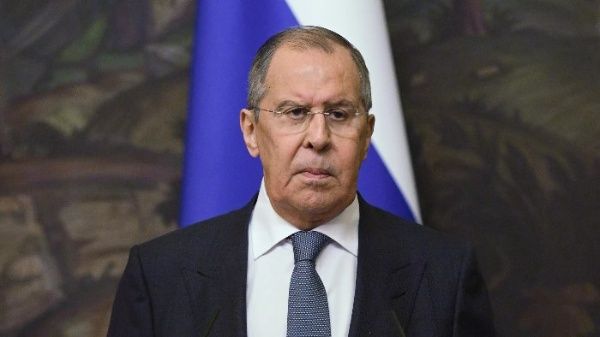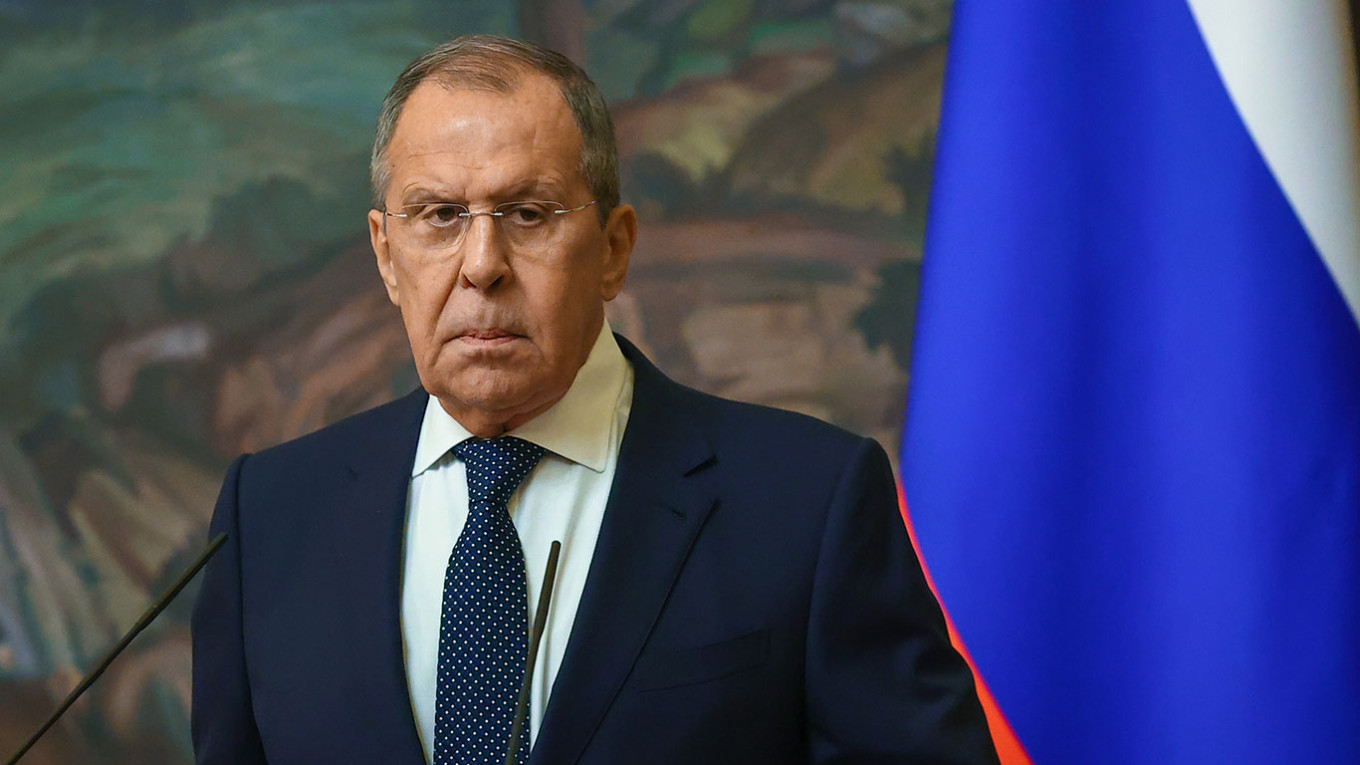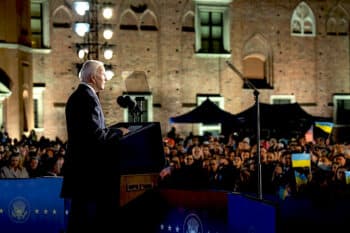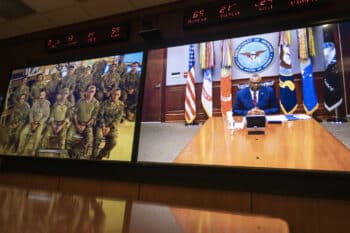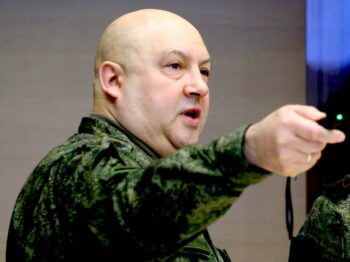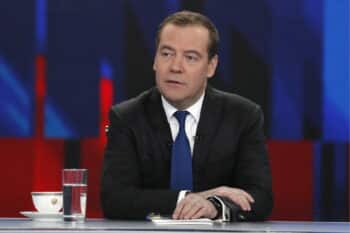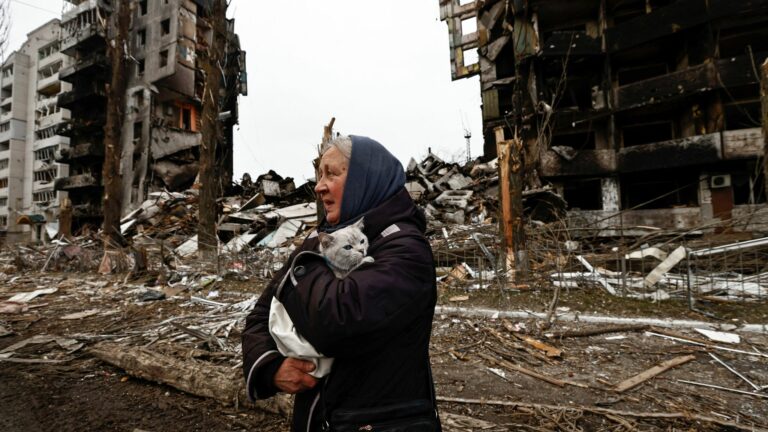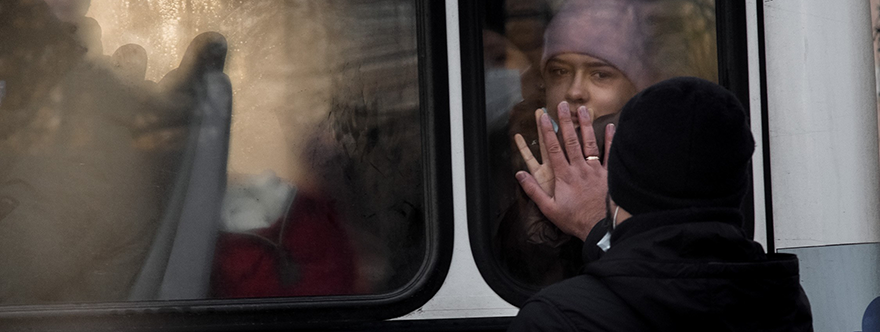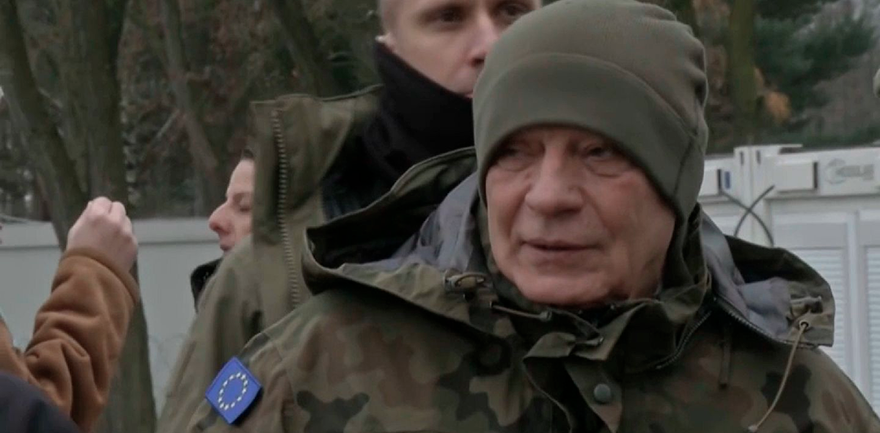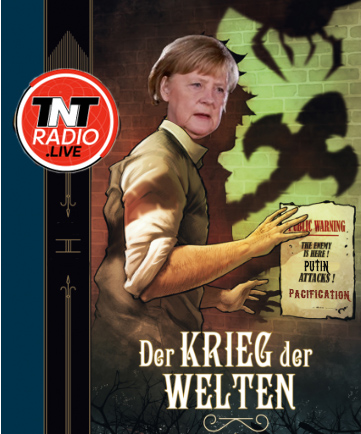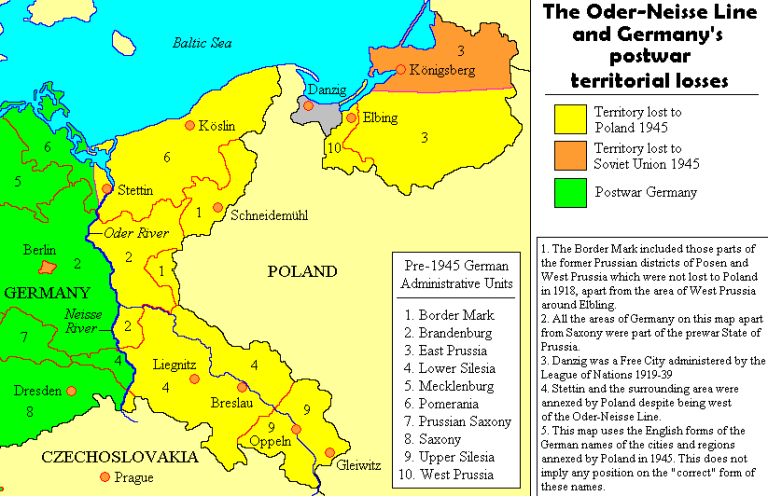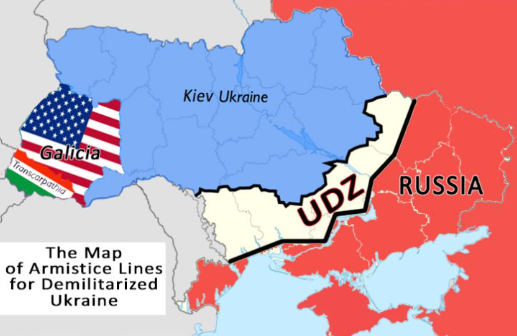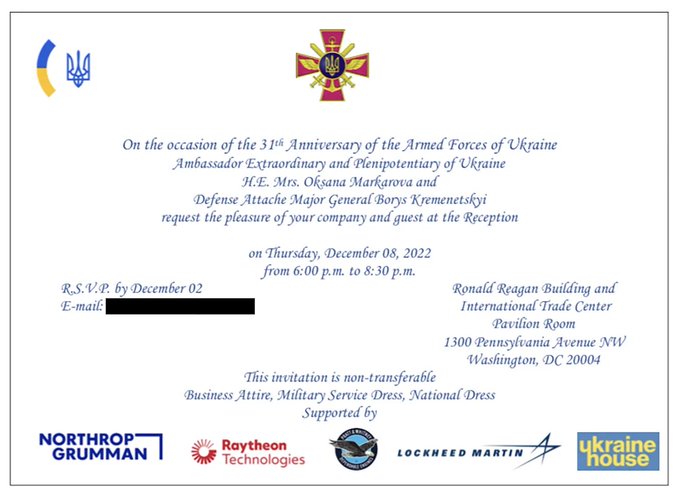Posted by INTERNATIONALIST 360° on DECEMBER 23, 2022
Moss Robeson
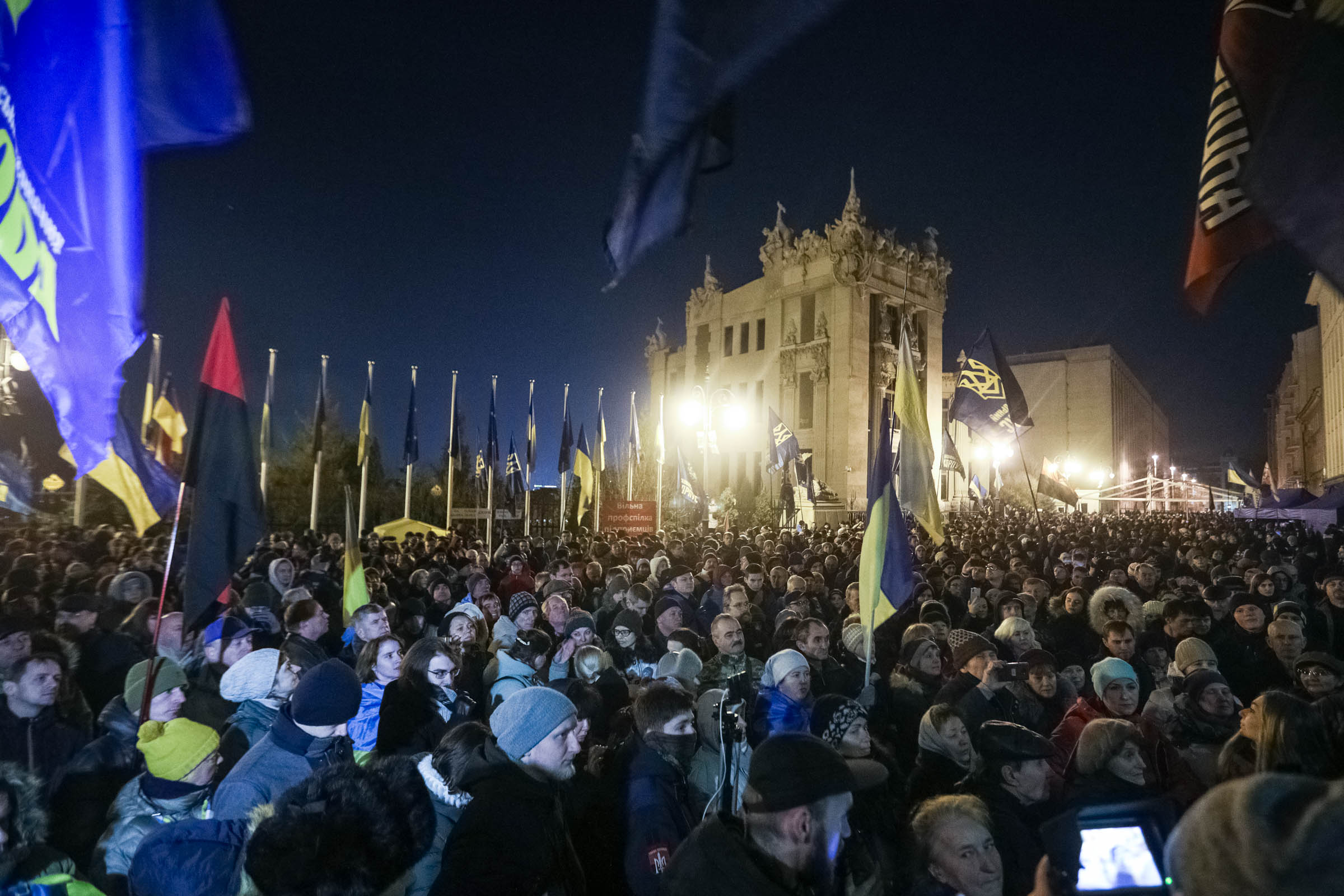
Activists attend a rally called “Night Watch” in front of Ukrainian President Volodymyr Zelensky’s office in Kyiv. They demanded “no capitulation” to Russia ahead of the next Normandy Format summit in Paris, on Dec. 8, 2019, among Ukraine, Russia, Germany and France.
‘NO CAPITULATION’
Valeriy Zaluzhny, the commander-in-chief of the Ukrainian armed forces, last month told the chairman of the U.S. Joint Chiefs of Staff, who has suggested that now is the time for Ukraine to negotiate with Russia, “We will not stop on this path under any circumstances. The Ukrainian military will not accept any negotiations, agreements or compromise decisions.” Since then, Zaluzhny has apparently taken a selfie with a portrait of Nazi collaborator Stepan Bandera.
In November 2021, Zaluzhny appointed Dmytro Yarosh, a notorious “Banderite” paramilitary leader who founded the extremist Right Sector, as an advisor. This is significant even if the arrangement didn’t last. Not long after Volodymyr Zelensky’s rise to power in spring 2019, Yarosh said the new Ukrainian president would be lynched if he “betrays” the nation. Just ahead of the election, the last season of Zelensky’s TV show aired, including a scene where the government is overthrown by Right Sector-style radicals who create a “Military-Nationalist” regime which causes the country to collapse into 28 independent states. According to Yarosh,
He just needs to understand one truth: Ukrainians should not be humiliated… Zelensky said in his inaugural speech that he was ready to lose his ratings, popularity, position… No, he would lose his life. He will hang on some tree on Khreschatyk [the main street of Kyiv] – if he betrays Ukraine and those people who died during the Revolution and the war.
A year ago, Zelensky seemed more concerned about a coup d’etat than a Russian invasion. In late November, he bizarrely told journalists there was a Russian-backed plot to overthrow him being planned for the first or second day of December, apparently referring to a rally in Kyiv being organized by the far-right “Capitulation Resistance Movement” to demand his resignation.
During the same marathon press conference, Zelensky lashed out at a controversial journalist (and speaker at the rally) for escalating tensions with Russia: “During the last week I had two or three international calls daily, including with the leadership of the EU, the US and Britain because of you.” Within a few days, Yuri Butusov, the provocative “journalist,” filmed himself firing artillery at eastern Ukraine to “avenge Holodomor,” and he joined a special council formed by the “Resistance Movement.” On December 1, Butusov and other nationalists demanded Zelensky’s removal from power. That month, journalist Leonid Ragozin referred to Butusov as a “spin doctor… who represents a group of security officials and politicians who attempted to impeach Zelensky by accusing him of betrayal in the so-called Wagnergate affair.”
In early February 2022, a couple weeks before Putin’s invasion, Ragozin observed, “While downplaying the risk of a Russian offensive and even reprimanding the West for sowing panic, the Ukrainian leadership appears preoccupied with a different threat – that of a coup.” In the same article (“What is Zelenskiy afraid of?”), he described the “Capitulation Resistance Movement” as “a radical street force dedicated to toppling Zelensky” and “a paramilitary force associated with the nationalist opposition that coalesced around former president Petro Poroshenko.”
Nationalists officially launched the “Capitulation Resistance Movement” (Rukh Oporu Kapitulyatsiyi, ROK) in October 2019 to sabotage Zelensky’s peace mandate after the political newcomer crushed Poroshenko and his political party in elections held earlier that year. “No Capitulation” became the slogan of a broader, far-right-led campaign against Zelensky and his government, with protests typically spearheaded by the neo-Nazi Azov movement and the ROK. “Zelensky ran as a peace candidate,” and the hardliners vigorously opposed him, the late Russia expert Stephen F. Cohen explained to journalist Aaron Maté that month.
“He won an enormous mandate to make peace. So, that means he has to negotiate with Vladimir Putin.” But there was a major obstacle. Ukrainian fascists “have said that they will remove and kill Zelensky if he continues along this line of negotiating with Putin… His life is being threatened literally by a quasi-fascist movement in Ukraine.” Peace could only come, Cohen stressed, on one condition. “[Zelensky] can’t go forward with full peace negotiations with Russia, with Putin, unless America has his back,” he said. “Maybe that won’t be enough, but unless the White House encourages this diplomacy, Zelensky has no chance of negotiating an end to the war. So the stakes are enormously high.”
That was three years ago. After Russia invaded, the ROK became the FURM, or the Free Ukraine Resistance Movement, which has mostly flown under the radar. After interviewing a representative of the FURM in early March, a neoconservative US journalist referred to the “Resistance Movement” as an “insurgency-in-waiting, one of many, no doubt, that plans to resort to guerrilla warfare in the event that Russian President Vladimir Putin’s attempted conquest of Ukraine turns into a prolonged occupation of major population centers.”
After keeping tabs on this “quasi-fascist” movement for a few years (although it mostly went dark after Russia invaded), I feel comfortable speculating that the ROK was partially responsible for making Zelensky feel that negotiating peace with Russia would be too dangerous for him. I also suspect that once Putin declared war, Zelensky as an actor felt his only choice was to become an action hero, not just to rally international support for his country, but to become so popular in Ukraine and the West to rule out a coup d’etat.
However, I don’t think Zelensky feels anywhere close to enough Western (particularly US and UK) support to negotiate with Russia, which would make the mantra adopted by Kyiv and Washington, “Nothing About Ukraine Without Ukraine,” an epic Catch 22 if Zelensky is too scared of fascists in the military to take the initiative. It might be fit for a Dr. Strangelove sequel unthinkable to Stanley Kubrick because “the Ukraine” was hardly a blip on Washington’s radar during most of the original Cold War. But perhaps the new framework is not so different after all. In his book, Blowback: America’s Recruitment of Nazis and its Destructive Impact on Our Domestic and Foreign Policy, Christopher Simpson wrote this about US support for the remnants of the OUN-B’s Ukrainian Insurgent Army at the dawn of the Cold War:
In practice… contradictory forces within the U.S. national security community produced a situation in which some CIA and OPC agents promised nearly unlimited military support to the [Nationalist/Banderite] insurgency [in western Soviet Ukraine] but actually delivered relatively little. In the end, U.S. aid was given to the rebels only insofar as it served short-term… [U.S.] objectives, no more… Instead, they were used as martyrs—some of whom died bravely; some pathetically—and grist for the propaganda mills of both East and West.
Whatever the accuracy of my speculation may be, the “Capitulation Resistance Movement” (ROK/FURM) is undoubtedly a critical vehicle for the OUN-B, or the clandestine Banderite faction of the far-right Organization of Ukrainian Nationalists, which played an important role in the “Holocaust by Bullets” in western Ukraine, and largely hijacked the diaspora during the Cold War. I would argue that if World War III starts in Ukraine, then the OUN-B has also played an important role in fulfilling this prophecy which the Banderites began to preach by 1945. “Do we… really want to provoke another world war?” an OUN-B affiliated publication asked five years later. “Of course not,” it answered, with the caveat that “a third world war will come, because it is inevitable.”
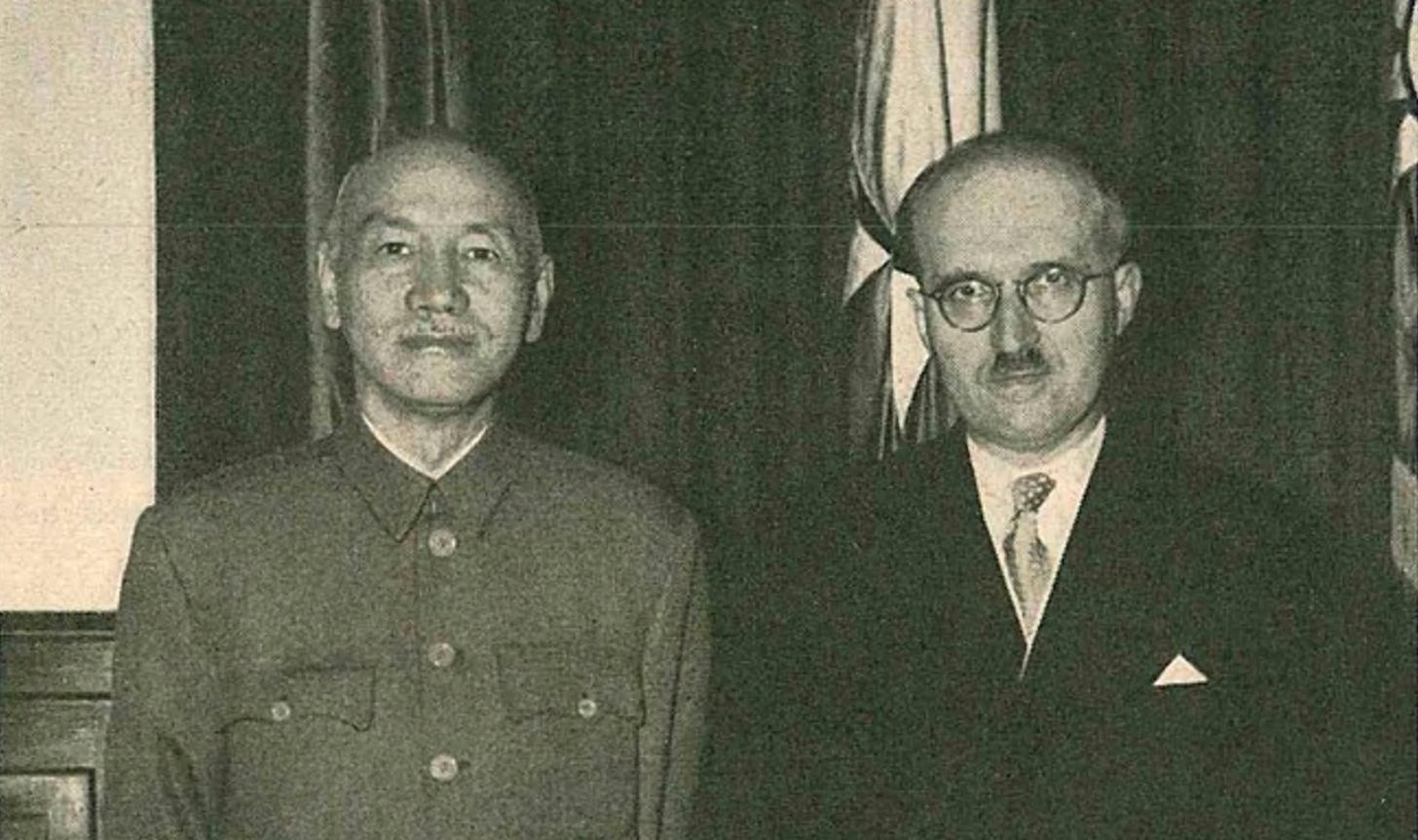
Chiang Kai-Shek and Yaroslav Stetsko in Taiwan, 1955. Stetsko was Bandera’s deputy and led the OUN-B from 1968 until he died in 1986. The OUN-B headquarters building in Kyiv is named after his wife, Yaroslava.
‘FREE PEOPLE’
Andriy Levus was always the first among equals of the Capitulation Resistance Movement’s coordinators. He made it official by February 2022 when Levus announced his leadership of the Free Ukraine Resistance Movement. For years, Andriy Levus has been an assistant to far-right politician Andriy Parubiy and coordinated an important OUN-B “facade structure” called Free People, of which there have been several iterations. From the start, Free People has served as a “second organization” for members of a militant Banderite youth group. All of these entities, including the “Bandera Organization” itself, are headquartered at the OUN-B’s Yaroslava building in Kyiv. So was the Capitulation Resistance Movement. This first installment will explain how “Free People” became its vanguard.
Old pictures of the OUN-B’s Youth Nationalist Congress, which uses the emblem of the “Dontsov beast,” a hybrid lion-wolf-hedgehog invented by fascist ideologue Dmytro Dontsov, who translated Mein Kampf into Ukrainian.
‘BANDERA YOUTH’
In 1993, the OUN-B, having recently returned to Ukraine after many years abroad, established the Congress of Ukrainian Nationalists (KUN), a far-right political party, as the foundation of its above board apparatus in the homeland. The network began to unravel by the end of the nineties after failures at the ballot box, and the paramilitary wing of the organization (Tryzub) went rogue. The KUN effectively replaced Tryzub with a youth wing, which the OUN-B later separated from its unpopular party to create the Youth Nationalist Congress (Molodizhnyy Natsionalistychnyy Konhres, MNK) in early 2001. The far-right MNK has resisted turning “Free People” into a political party, probably so that it doesn’t suffer the same fate as the KUN, which is practically irrelevant, and apparently autonomous but led by an OUN-B member.
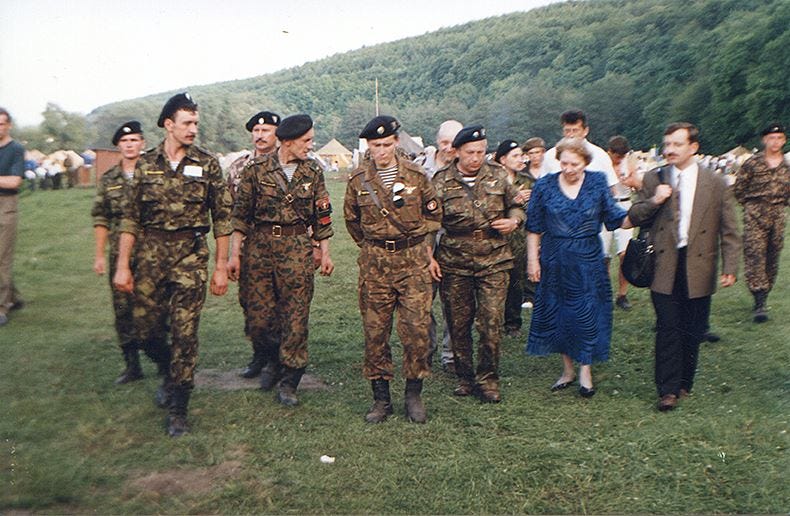
Dmytro Yarosh (center with sunglasses on his chest) and members of Tryzub in 1995 with Yaroslava Stetsko, who led the OUN-B from 1991-2001, and died in 2003 after a decade of chairing the Congress of Ukrainian Nationalists, which is now led by Stepan Bratsiun (in the suit), who married Stetsko’s niece.
Andriy Levus joined the “Bandera Youth” in his early-to-mid twenties. It’s where he met his wife. The first leader of the MNK is the editor of the OUN-B newspaper. The second MNK chairman was the deputy head of OUN-B by 2013 and a deputy commander of the “Maidan Self-Defense” in early 2014. The third MNK leader quickly became an “assistant-consultant” to far-right politician Andriy Parubiy, who formerly led the paramilitary arm of the neo-Nazi “Social National Party of Ukraine.” The third MNK leader manages the OUN-B’s publishing house. By 2009, when Andriy Levus turned thirty years old, the OUN-B made him the director of its Ukrainian Information Service in Kyiv, and he also started working for Parubiy. It appears that Levus hasn’t left his side.
Ten years later, Volodymyr Zelensky’s overwhelming electoral victories spelled the end of Andriy Parubiy’s chairmanship of the Verkhovna Rada, or Ukrainian parliament. Levus continued working with Parubiy, a leader of Poroshenko’s “European Solidarity” party, after organizing the “Resistance Movement.” After all, Parubiy and Levus largely directed the muscle behind the “Maidan revolution” in early 2014. Five years later, an OUN-B organizer of the Capitulation Resistance Movement told The Daily Beast, reacting to Zelensky’s landslide election victory, “We are going to raise a new Maidan revolution if he makes a single step away from our course.”
FREE PEOPLE 1.0 — ‘EURO OFFENSIVE’
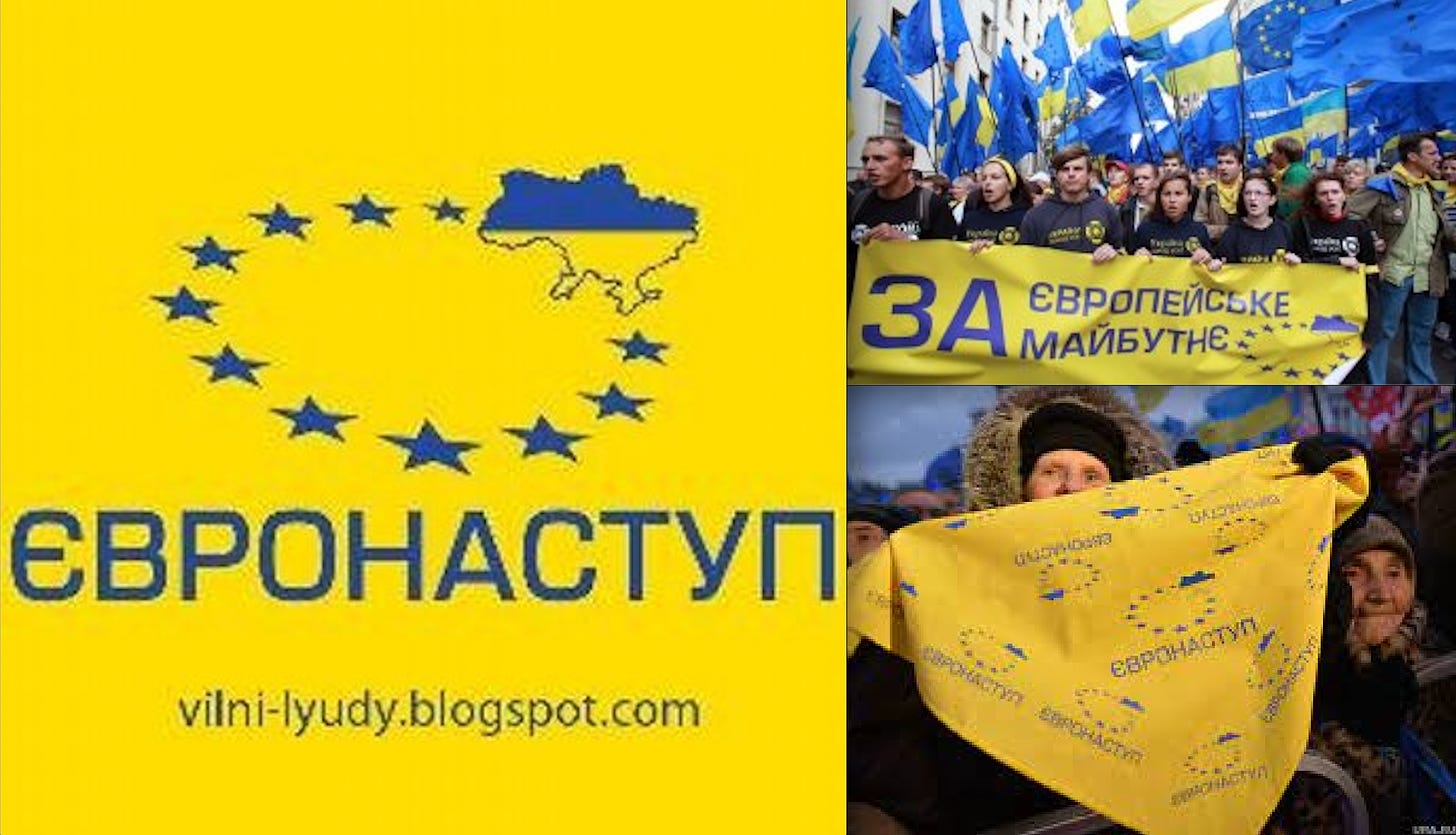
In October 2013, almost a month before the “Euromaidan” began, members of the OUN-B’s Youth Nationalist Congress led a “Euronastup” march in Kyiv.
The first iteration of the “Free People network” was established in April 2013 as the OUN-B’s contribution to the Euronastup (“Euro Offensive”) campaign led by Serhii Bondarchuk, a minor politician. A Free People blog initially functioned as the Euronastup website. That summer, Bondarchuk organized a “national round table” (with Levus as its “executive secretary”) to push the Ukrainian government to sign a controversial Association Agreement with the European Union on November 29. In early November, about ten days after kicking off a “Euroreferendum” petition campaign, Bondarchuk predicted that the delivery of a million signatures on November 22 could represent the “beginning of Euromaidan.” In fact, the protest movement (which he apparently named) started the night before, after the pro-Russian government signaled its decision not to sign.
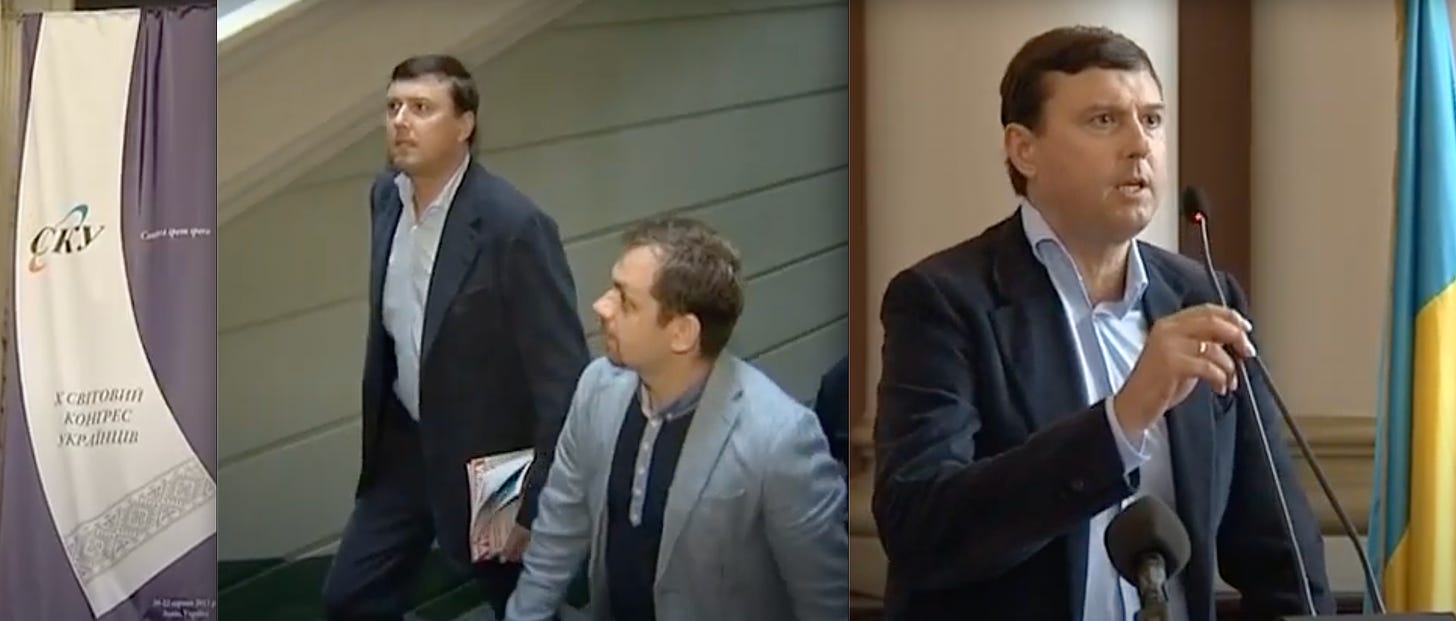
Bondarchuk and Levus (center) at the 10th Ukrainian World Congress (UWC), held in Lviv, August 2013. The UWC re-elected its Banderite president from Canada, and made the OUN-B leader from Australia its new secretary general.
FREE PEOPLE 2.0 — ‘EUROMAIDAN’
On November 22, 2013, an obscure international coordinating body of Banderite “facade structures,” formerly known as the World Ukrainian Liberation Front, convened at the OUN-B headquarters in Kyiv, located a short walk from Maidan Nezalezhnosti (Independence Square). Today this organization is called the “World Council of Ukrainian Statehood Organizations,” but only in Ukrainian. In English, it is known as the International Council in Support of Ukraine (ICSU). “Free People” became a dues-paying member five years later.
At this November 2013 meeting of the ICSU, its headquarters was relocated, at least on paper, from New York to Toronto, as the presidency changed hands to Yuri Shymko, a former Canadian politician. The year before, the ICSU called for US-backed “regime change” in Kyiv, and implored “nationally conscious Ukrainian patriots” around the world to “demand that enemy agents of Moscow’s fifth column be deported from Ukraine.”
The OUN-B network in Canada attained unprecedented influence during the Conservative premiership of Stephen Harper (2006-15), but has apparently been under the thumb of a Banderite from the Detroit suburbs who replaced Shymko as ICSU president. Borys Potapenko of Warren, Michigan, a former executive director of the League of Ukrainian Canadians, is today a leader of the “Free Ukraine Resistance Movement” and is said to be ranked #3 in the global OUN-B hierarchy.
From the first day of the Euromaidan protests, before they adopted that name, Euronastup campaigners provided tea and food to demonstrators, and set up an “information center” on Independence Square that said, “For the European future.” At the end of the first week, Stefan Romaniw of Melbourne, Australia read fifty greetings to the Maidan from Ukrainian organizations in twenty different countries. Romaniw did so as the new secretary general of the Ukrainian World Congress, the longtime chairman of the Australian Federation of Ukrainian Organizations, and the international OUN-B leader since 2009.
Two days later, riot police violently dispersed protesters and unleashed a massive escalation of the Euromaidan. The paramilitary Banderite organization Tryzub, led by Dmytro Yarosh, brokered the extremist Right Sector alliance, which included multiple neo-Nazi groups. The three main opposition parties, including the neo-fascist Svoboda party (with one or two OUN-B members in its leadership) established the “National Resistance Headquarters.” Andriy Parubiy also set up the Maidan Self-Defense (MSD) under his command, with Andriy Levus as his deputy.
Levus was initially put in charge of the “commandant’s office” and the “mobilization service.” The yellow Euronastup tents, next to the stage on the Maidan, became part of the “mobilization center” for the MSD. Levus explained in a December 2013 interview, “To the left of the stage is the so-called Military Commissariat. People come there, we collect them, and then distribute them by the hundreds. Over time, we check them.” The Youth Nationalist Congress formed the 14th and 15th companies, or “hundreds.” Levus took charge of them both, but it was the fourteenth that was named “Free People” (Vilny Liudy) and adopted an anarchistic V symbol.
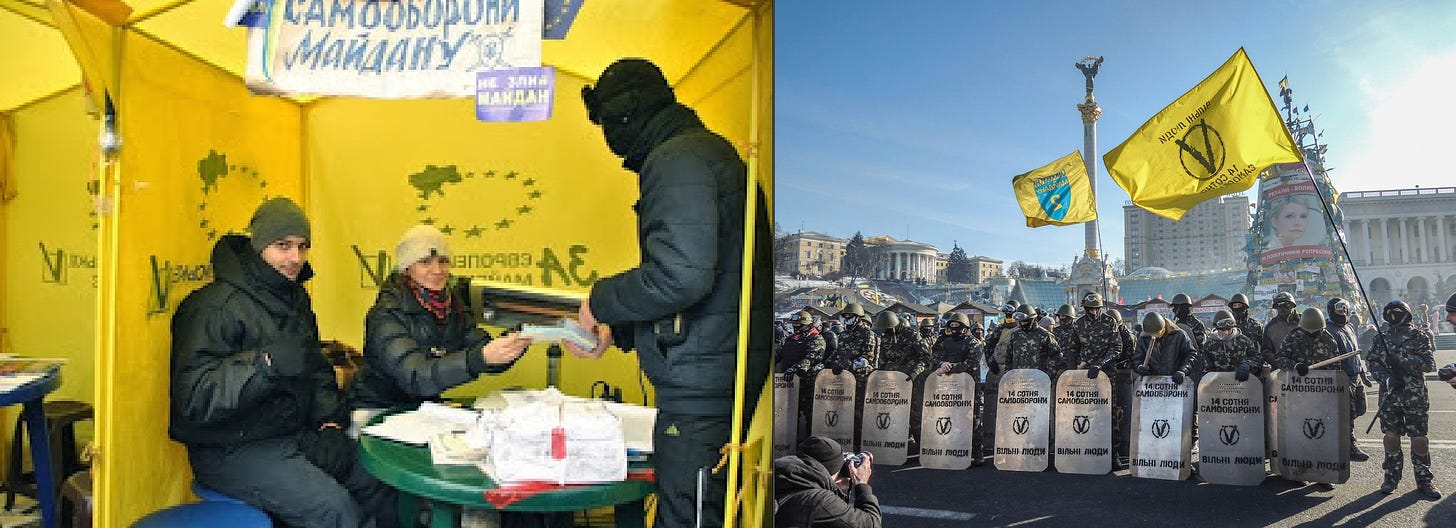
Euronastup tent, December 2013; and “Free People” MSD unit, February 2014
The so-called “Free People movement” might have played a small role in the protests aside from Andriy Levus, who became the deputy head of the MSD by February 2014. In the aftermath of Ukrainian president Viktor Yanukovych fleeing to Russia and ceding victory to the “revolution” later that month, Levus told the New York Times that in the final days, he was ready for a bloody showdown with the government, because “he had reinforcements on the way.”
Protesters in Lviv had overrun an Interior Ministry garrison and were en route to Kiev with the captured military weapons. “I’m reluctant to talk about this because we are protesters and not illegal armed groups,” Mr. Levus said. “But the square was about to look different. There would be more people, and they would not have had empty hands.”
On February 20, 2014 in Kyiv, dozens of protesters were killed in a mysterious “sniper’s massacre” that started around 9am. About forty-five victims were fatally shot by the time Andriy Levus reportedly started to negotiate a ceasefire with a government official. “I told him,” Levus told the New York Times, “We will guarantee the safety of the police if they leave the city.” As the Ukrainian Canadian scholar Ivan Katchanovski introduced his groundbreaking essay on the “Maidan massacre,”
The massacre of almost 50 Maidan protesters on February 20, 2014 was a turning point in Ukrainian politics and a tipping point in the conflict between the West and Russia over Ukraine. This mass killing of the protesters and the mass shooting of the police that preceded it led to the overthrow of the pro-Russian government of Viktor Yanukovych and gave a start to a civil war in Donbas in Eastern Ukraine, Russian military intervention in Crimea and Donbas, and an international conflict between the West and Russia over Ukraine. A conclusion promoted by the post-Yanukovych governments and the media in Ukraine that the massacre was perpetrated by government snipers and special police units on a Yanukovych order has been nearly universally accepted by the Western governments, the media, and many scholars… This paper is the first academic study of this crucial case of the mass killing… This academic investigation concludes that the massacre was a false flag operation, which was rationally planned and carried out with a goal of the overthrow of the government and seizure of power. It found various evidence of the involvement of an alliance of the far right organizations, specifically the Right Sector and Svoboda, and oligarchic parties, such as Fatherland. Concealed shooters and spotters were located in at least 20 Maidan-controlled buildings or areas. The various evidence that the protesters were killed from these locations include some 70 testimonies, primarily by Maidan protesters, several videos of “snipers” targeting protesters from these buildings, comparisons of positions of the specific protesters at the time of their killing and their entry wounds, and bullet impact signs. The study uncovered various videos and photos of armed Maidan “snipers” and spotters in many of these buildings. The paper presents implications of these findings for understanding the nature of the change of the government in Ukraine, the civil war in Donbas, Russian military intervention in Crimea and Donbas, and an international conflict between the West and Russia over Ukraine.
(more...)
https://libya360.wordpress.com/2022/12/ ... -movement/
The Ukraine Lobby: Zelensky & Congress Salute “Representatives of the Diaspora”
Posted by INTERNATIONALIST 360° on DECEMBER 23, 2022
Moss Robeson
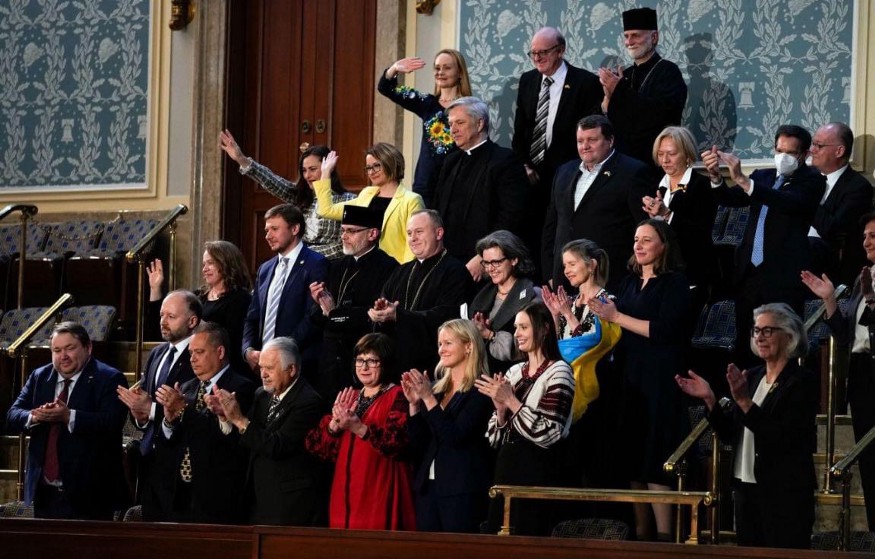
Natalia Jaresko, former Finance Minister of Ukraine, in red. Andrew Mac is in the 3rd row, without a tie.
During Ukrainian president Volodymyr Zelensky’s address to a joint session of Congress on Wednesday, a group of Ukrainians sat in the gallery of the House Chamber. Soon after Zelensky stepped up to the rostrum, they cheered, “Slava Ukraini!” The President of Ukraine waved back at them and answered, “Heroyam Slava.” Some members of Congress looked up and turned around with surprised smiles.
A few minutes later, Zelensky prompted Congress’ first standing ovation during his speech by addressing “dear representatives of [Ukrainian] diaspora…” He paused for a moment and nodded at those in the gallery. Later on, they again chanted “Slava Ukraini!” This time, some members of Congress finished the Nationalist call and response: “Heroyam Slava!” But who were the special guests?
For starters, there was Andrew Mac, a lawyer in Washington and unpaid advisor to Zelensky that Politico has identified as “one of the biggest Washington power players for Ukraine.” A significant portion of the “representatives of diaspora” consisted of Ukrainians that work for the International Monetary Fund (IMF), the World Bank, or the Embassy of Ukraine. Perhaps an invitation went out to the World Bank Group-IMF Ukrainian Staff Association, or just its chairman, who sat in the front row of the gallery.
Also in the front row was Natalie Jaresko, the Ukrainian American former Finance Minister of Ukraine (2014–16), in which capacity she proudly negotiated “the largest IMF program in the institution’s history.” Her presence seemed like a bad omen. In 2016, Jaresko was considered a “top candidate for prime minister.” Earlier this year, Jaresko stepped down as the executive director of the Financial Oversight and Management Board for Puerto Rico, also known as “La Junta,” which Alexandria Ocasio-Cortez has described as “the Wall Street-connected fiscal control board that the US gave power to over the island.” Now with Ukraine facing a debt trap after the war, Jaresko appears to be part of a financial clique that has taken the reins of the “Ukraine lobby” in Washington since Joe Biden took office.
On February 25, 2021, Volodymyr Zelensky appointed Oksana Markarova as the Ambassador of Ukraine to the United States. At the turn of the 21st century, Markarova interned at the World Bank in Washington between jobs at the Western New Independent States Enterprise Fund (WNISEF), which the U.S. Agency for International Development financed to invest in “small and medium-sized companies” in Ukraine. Natalie Jaresko, the CEO of WNISEF, co-founded Horizon Capital, “the leading private equity firm in Ukraine,” to manage this $150 million investment fund backed by the U.S. government. Markarova served as the Minister of Finance in 2018–20, but got started as a deputy minister under Jaresko in 2015.
The Ukrainian ambassador didn’t sit in the gallery, but feet away from the rostrum, so Natalie Jaresko sat next to Alexa Chopivsky, who is a program director of the Aspen Institute, a prominent Washington think tank founded in 1949. Jaresko chairs Aspen Institute Kyiv, its partner organization in Ukraine. Chopivsky’s father George sits on the board of directors of the Atlantic Council, which typically receives $100,000 a year from his Chopivsky Family Foundation. Jaresko is a former distinguished fellow with the Atlantic Council’s Eurasia Center, which is directed by John Herbst, a board member of the Western NIS Enterprise Fund who formerly served as the U.S. Ambassador to Ukraine (2002–2006).
Until recently, Alexa Chopivsky was the executive director of Ukraine House Davos, a sideshow at the annual World Economic Forum in Davos, Switzerland purporting to showcase the “new Ukraine.” Chopivsky chaired the organizing committee of Ukraine House Davos. The other three members represented the WNISEF, Horizon Capital, and the foundation named for Ukrainian oligarch Viktor Pinchuk that has contributed hundreds of thousands of dollars to the Atlantic Council.
Last year, Volodymyr Zelensky opened a permanent Ukraine House in Washington, which is essentially a cultural center associated with the Embassy of Ukraine. Alexa Chopivsky and Andrew Mac were among the “recipients of honorary awards” at the ceremony. Ambassador Markarova is one of three members of the advisory board of Ukraine House DC. In 2016, Markarova oversaw the launch of UkraineInvest, “the Ukrainian government’s foreign direct investment promotion agency.” Chopivsky joined its supervisory board.
Lesya Sevruk, a member of Ukraine House’s executive board, formerly worked as an advisor to UkraineInvest and Markarova in the Finance Ministry. Danylo Volynets, one of the other two members of the executive board, also sits on the board of the ITT Investment Group, which Markarova led for a dozen years. The Ukraine House DC Foundation is partnered with the Olena Zelenska Foundation and United24, which Volodymyr Zelensky launched as “the main venue for collecting charitable donations in support of Ukraine.”
Alexa Chopivsky and the CEO of Horizon Capital each moderated a “break-out session” at the July 2022 Ukraine Recovery Conference co-hosted by the Swiss and Ukrainian governments in Lugano, Switzerland. According to the event’s website, it was largely dedicated to discussing the “Recovery and Development Plan of Ukraine (within United 24 initiative of President Zelensky).” According to Multipolarista, “the Ukraine Recovery Conference’s economic proposal was little more than a repackaged Washington Consensus: a typical right-wing program that involves implementing mass privatizations, deregulating industries, gutting labor protections, cutting taxes on the rich, and putting the burden on Ukrainian workers.” In September, Zelensky virtually joined the “$125 million signing ceremony of a new Ukraine-focused fund” launched by Horizon Capital.
The administrative director of Ukraine House DC sat in the gallery of the House Chamber with her husband, an assistant to Ambassador Markarova and Third Secretary of the Embassy of Ukraine. At least two or three other “representatives of diaspora” present also worked at the embassy. That included its First Secretary for press and media, and a Next Generation Leader at the McCain Institute who formerly “worked for the U.S. Embassy in Kyiv as the principal liaison officer with Ukraine’s parliament.” There was also the Deputy Chief of Mission at the Embassy of Ukraine, unless she is now a consultant for the World Bank.
The aforementioned chairman of the World Bank Group-IMF Ukrainian Staff Association sat next to an alternate executive director of the IMF. Sitting behind them was Roman Kachur, an alternate executive director of the World Bank. In 2004–2007, Kachur was a vice-president of ITT Investment Group. In 2015–16, like former ITT president Oksana Markarova, he was a Deputy Minister of Finance under Natalie Jaresko, until he joined the board of directors of the World Bank.
Also invited to hear Zelensky’s speech to Congress were the leaders of the trio of Ukrainian American organizations favored by the Embassy of Ukraine. These are: US Ukrainian Activists (USUA) and United Help Ukraine (UHU) in Washington, and Razom for Ukraine in New York. These organizations have sprung up since 2014. The following year, one of their members described the embassy as a “playground for meetings, discussions and charity events.” In 2021, the USUA formed a 501(c)3 organization, and the Ukrainian government opened a bigger “playground” called Ukraine House.
Of course, the “representatives of diaspora” included at least a few veterans of the Ukraine lobby, which Nationalists led during the Cold War. Orest Deychakiwsky, a policy advisor for the U.S. Helsinki Commission, isn’t a “Banderite,” or follower of Nazi collaborator Stepan Bandera (1909–59), but his father was a member of Bandera’s fascistic Organization of Ukrainian Nationalists. In 1980, the OUN-B, or clandestine Banderite faction of the Organization, staged a controversial takeover of the Ukrainian Congress Committee of America (UCCA). Newer organizations like USUA, UHU, and Razom haven’t joined the allegedly corrupt, Banderite-led Congress Committee, which has struggled to keep up with the all pro-Ukraine activism in 2022.
Banderite proxies still run the UCCA, including its president Andriy Futey, who sat with his father Bohdan between IMF officials and Natalie Jaresko in the House Chamber. In 1984, four years after the Banderite “coup” of the UCCA, Bohdan Futey went from being its leader in Cleveland to the head of the U.S. Foreign Claims Commission. In 1987, Ronald Reagan appointed him to the U.S. Court of Federal Claims. A couple years later, in his book Old Nazis, the New Right, and the Republican Party, journalist Russ Bellant disclosed that he interviewed an OUN-B member. “You have to understand,” explained the Banderite. “We are an underground organization. We have spent years quietly penetrating positions of influence.” According to Bellant, Bohdan Futey was “described as [one of] the contact points between the OUN-B and the White House.” Since I started writing this, someone in the Ukrainian community has declared that “Andriy Futey leaks [sic] Waz ass!” For those who don’t read my Bandera Lobby Blog, “Waz” is the nickname of the U.S. leader of OUN-B.
The Banderite-led Congress Committee is a shell of its former self, which nevertheless pretends to remain the official spokesbody of the Ukrainian community, akin to the Ukrainian Canadian Congress. The UCCA’s most active branch, the Illinois Division, has two vice presidents for “Government and Community Relations.” One is an aggressive OUN-B leader in Chicago. The other is a friend of the “Bandera Lobby” in addition to a board member of Western NIS Enterprise Fund who joined the steering committee of “Ukrainian Americans for Biden.”
The Chicago area is a hotbed of Ukrainian nationalism, and where Natalie Jaresko grew up. Earlier this year she recalled, “I spent my Saturdays learning Ukrainian language, culture, literature, and history. With your eyes closed, you had to be able to go through the rivers and tributaries of Ukraine and the mountains and every major town.” Her brother John is the president of the parish board of St. Andrew’s Ukrainian Orthodox Church in Bloomingdale, a suburb of Chicago. A local OUN-B leader is vice president.
John Jaresko at least used to be a member of the right-wing Suburban Council of Ukrainian Voters (aka “Ukrainians for Trump”) in Illinois, led by members of the OUN-B affiliated Organization for Defense of Four Freedoms for Ukraine (ODFFU). In 2019, St. Andrew’s hosted a dubious OUN-B “extraordinary convention” that declared a new ODFFU board of directors and a new manager of its headquarters building in Manhattan, formerly known as the “Home of the Organizations of the Ukrainiain Liberation Front.” The Banderite president of UCCA-Illinois chaired the meeting. Andriy Futey sent his greetings to the overthrow of the “old board” that essentially made “Waz” the ODFFU leader in New York.
Although the “Bandera Lobby” is falling behind the “Ukraine Lobby,” it was the Banderites who started the call and response “Slava Ukraini — Heroyam Slava,” originally accompanied by a fascist salute. Numerous “Ukraine experts” in Washington, and in particular at the Atlantic Council, are on a first name basis with Walter “Waz” Zaryckyj as the longtime executive director of the Center for US-Ukrainian Relations (CUSUR), which is an OUN-B “facade structure.” In Bloomingdale, the Banderites installed CUSUR’s Washington bureau chief as the new ODFFU president. The UCCA and CUSUR can still bend ears in the Congressional Ukraine Caucus and Senate Ukraine Caucus. And their days may be numbered, but the OUN-B still looms large over the Ukrainian World Congress (UWC). “Waz” is the last known chairman of its International Scholarly Council. Banderites have held the UWC presidency throughout the 21st century, including a plotter of the “extraordinary convention” in Bloomingdale who later advised “Ukrainian Americans for Biden.”
Lenna Koszarny, the CEO of Horizon Capital and Executive Vice-President of WNISEF, is a Canadian vice president of the Ukrainian World Congress who served on the organizing committee of Ukraine House Davos. Another UWC vice president is the WNISEF board member who is also vice president of UCCA-Illinois. Lenna Koszarny, Natalie Jaresko, and George Chopivsky are all members of the UWC Advisory Council. Another member is Borys Gudziak, archbishop of the Ukrainian Greek-Catholic in the United States, who also made it to Washington on Wednesday.
Perhaps Zelensky’s interaction with Ukrainians in the gallery was orchestrated to put any Republican legislators on notice who might have thought about heckling him, and/or to send a message to certain parties that Zelensky is standing side by side with the self-described “rabid Ukrainian diaspora” that raged against him before the war. Volodymyr Zelensky has certainly won the hearts and minds of many, such as UCCA president Andriy Futey, who now fawns over him: “my hero!” But in 2019, days after the Banderite Bloomingdale conclave, the OUN-B launched the far-right “Capitulation Resistance Movement” in Kyiv against the newly elected President of Ukraine, when Zelensky was still presumed to be a peacemaker.
Nationalists in the diaspora cheered the protests, which threatened to escalate and topple the government. Zelensky subsequently appointed DC lawyer Andrew Mac as an advisor, reportedly “with a mandate to build relations with ethnic Ukrainians living in the United States.” On Wednesday night, Mac sat next to Irena Chalupa, who read poetry at the 1986 funeral of Yaroslav Stetsko, a Nazi collaborator who led the OUN-B from 1968 onwards. Stetsko, an antisemitic OUN-B ideologue, unsuccessfully declared the pro-Nazi “restoration of Ukrainian statehood” in 1941 German-occupied western Ukraine as its short-lived “Prime Minister,” on the eve of unleashing pogroms across the region. Chalupa sat between Andrew Mac and Michael Sawkiw, the UCCA’s Washington bureau chief, who mourned the death of Stetsko in a letter to a Ukrainian American newspaper.
Irena Chalupa, unrelated to Andrea and Alexandra Chalupa, worked for Stetsko in the OUN-B’s Cold War headquarters building in 1980s Munich before starting her career with the U.S. propaganda broadcaster Radio Free Europe/Radio Liberty (RFE/RL). Andriy Haidamakha, a Belgian-born Banderite who directed the Kyiv bureau of RFE/RL in 1990s Ukraine, succeeded Yaroslav Stetsko’s wife as OUN-B leader from 2001–2009. In those days, a veteran of the Ukrainian Waffen-SS led the OUN-B in Ukraine. From 2007–2011, Irena Chalupa directed the Ukrainian language service of RFE/RL. In 2014, the Atlantic Council partnered with the Ukrainian World Congress, and Chalupa subsequently became a leading contributor to the think tank’s “UkraineAlert” blog. Her British Banderite journalist husband also wrote for them after embedding with the Azov Battalion.
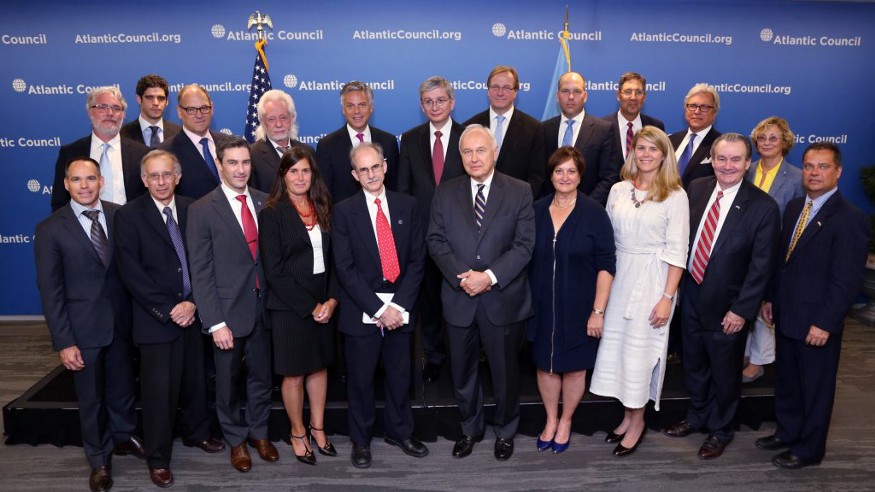
Launch of Atlantic Council partnership with UWC, October 2014. George Chopivsky is standing front and center, and Andriy Futey is on the far right. Lenna Koszarny is dressed in white.
As previously reported by “Ukes, Kooks & Spooks,” the neo-Nazi press officer of the Azov Regiment visited Washington last month, and stopped by the Ukrainian Saturday school in Bethesda, Maryland where Chalupa teaches literature. The principal of the Taras Shevchenko School of Ukrainian Studies of Greater Washington also received an invitation to witness Zelensky’s speech to Congress. Irena Chalupa is among other things a producer for Stop Fake, an info warrior outlet in Ukraine that has whitewashed the far-right.
In early November, Azov Regiment fighter and photographer Dmytro Kozatsky appeared on MSNBC alongside Oksana Markarova to promote a book that includes photos by Kozatsky and an essay by the Ukrainian Ambassador. That same day, Markarova and Kozatsky attended a related event at Ukraine House, the US partner of United24, which used the same self-portrait by Kozatsky that made the front cover of the book. From Washington, after visiting the school in Bethesda, Kozatsky hitched a ride to New York with a motorcade sponsored by United Help Ukraine, the president of which attended the recent joint session of Congress.
The president of Razom for Ukraine also made it, although she had to catch a train in Manhattan, where she recently took a selfie with Kozatsky outside of the Ukrainian National Home, which is puppeteered by Banderites, next door to their US headquarters building. Earlier this year, Razom organized a protest in Manhattan at which protesters chanted, “Azov! Azov! Azov!” Years ago, Razom invited a member of Right Sector, a notorious extremist organization in Ukraine, to a meeting of the World Bank Group-IMF Ukrainian Staff Association.
This past September, the Azov movement sent a delegation to the United States, including the wife of the Azov Regiment commander and the leader of an anti-feminist group affiliated with the neo-Nazi movement, both of whom spoke at one of the USUA’s weekly rallies in front of the White House. At events with the Ukrainian community, the representatives of Azov promoted their new charity wing, in which the ideological female figurehead of their movement has gotten involved.
Earlier this month, Kozatsky returned to Washington to participate in an annual “Ukraine in Washington & Beyond” symposium organized by the US-Ukraine Foundation (USUF), an influential think tank, and self-described “do-tank.” Orest Deychakiwsky, a vice-chairman of the USUF, sat between the Greek-Catholic archbishop and president of “US-Ukrainian Activists” on Wednesday. Deychakiwsky co-chairs a task force of the USUF’s Friends of Ukraine Network, which described itself by 2019 as “the largest, highest level and most politically diverse group of Americans to call for arming Ukraine with American weapons.” That year, the Canary UK warned that the “Friends” were “pushing a frightening escalation of the armed conflict in Ukraine.” In 2020, Deychakiwsky joined the steering committee of the Democratic National Committee’s “Ukrainian Americans for Biden,” perhaps as its chairman.
In the summer of 2020, I wrote one of my first articles about the USUF hosting a webinar with a neo-Nazi leader of Right Sector. Deychakiwsky’s brother is a volunteer for United Help Ukraine who donated hundreds of dollars to the short-lived “Right Sector USA.” In years past, the USUF and UHU have both worked with a Ukrainian nationalist “volunteer movement” in Syracuse that is closely associated with the far-right Banderite paramilitary leader who founded Right Sector. The point here isn’t that “neo-Nazis” run the Ukraine lobby, but that the Banderite “representatives of diaspora” can almost say “mission accomplished” and retire. Of course, that won’t happen until the nuclear bombs start to fall.
https://libya360.wordpress.com/2022/12/ ... -diaspora/
****
The Pentagon Audit: Assets Gone Missing
DECEMBER 23, 2022
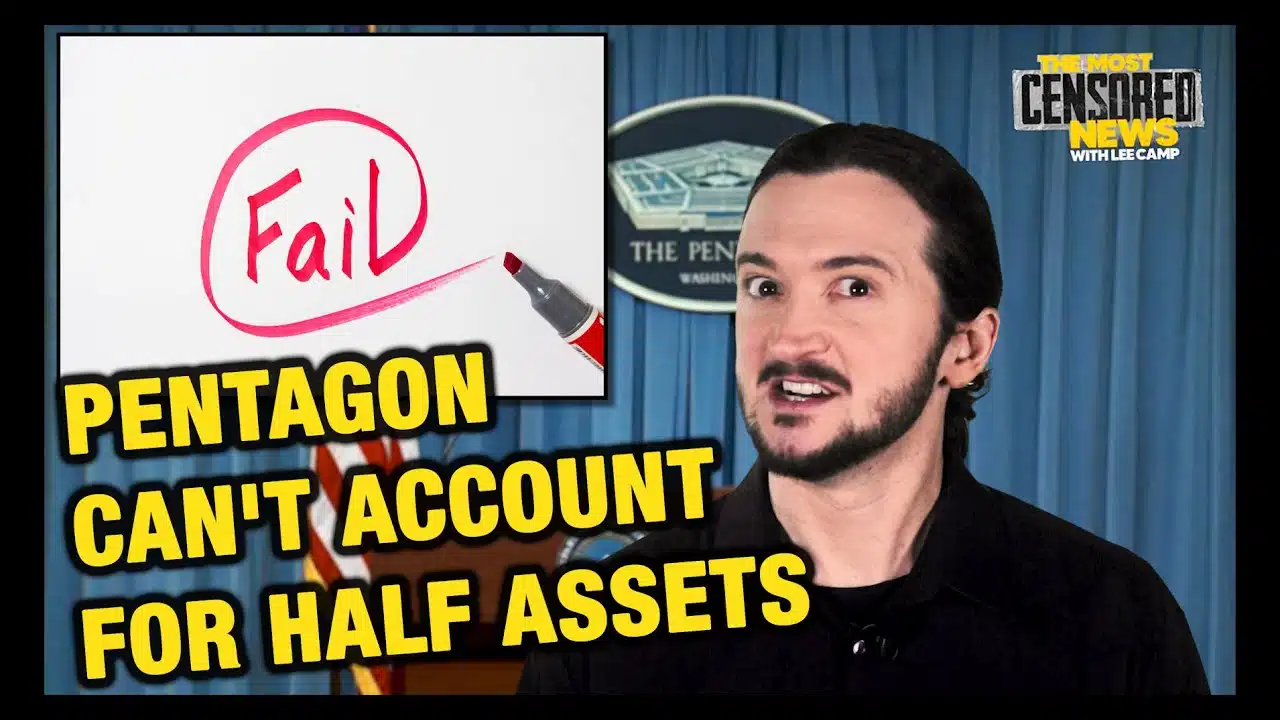
Photo: MintPress News.
By Lee Camp – Dec 16, 2022
The Pentagon – the U.S. “Defense” Department – was just audited for the fifth time. And they just announced they failed for the fifth time. If that’s not accountability, I don’t know what is!
When I say they “failed” their audit, I don’t mean they put a 9 instead of a 7 on one of the balance sheets, causing two soldiers to get accidentally left in Antarctica freezing their asses off. I mean, they really failed their audit. As The Hill put it, “The Defense Department has failed its fifth-ever audit, unable to account for more than half of its assets, but the—” Hold up. Hold up. Did ya catch that? They can’t account for over half their assets! This is the largest murder machine on the planet – nearly a trillion dollars spent every year – and they don’t know where half their shit is?! How is this not criminal?
If you worked at a shoe store, or a hardware store, or a daycare, and you couldn’t locate half your inventory, you’d be locked up right now! But apparently, if you’re simply responsible for more killing on the planet earth than any other modern organization, no one’s held accountable for anything.
Let’s get back to that quote, “The Defense Department has failed its fifth-ever audit, unable to account for more than half of its assets, but the effort is being viewed as a ‘teachable moment,’ according to its chief financial officer.” A teachable moment? It’s not like they left the gate open and their new puppy ran over to the neighbor’s yard and got all muddy. That’s a teachable moment! The U.S. military can’t account for trillions of dollars worth of killing devices.
But let me back up for a second. Federal law has required mandatory audits of all government agencies since 1990. The Pentagon simply ignored that requirement until 5 years ago. Why did no one in Congress demand they abide by federal law before that? Because it turns out – the Pentagon has all the things that go “bang-bang.” So they pretty much do whatever they want.
But even without that audit, the American people eventually found out that from 1998 to 2015, there were $21 Trillion of unaccounted-for financial adjustments on the Pentagon’s books. Believe it or not, I’m one of the few people who actually covered that story when it broke. (I would link to that video right now, except that YouTube has banned all my old videos around the world. Yay freedom of speech!) There was, however, one story in Forbes in which they asked if the government is hiding $21 Trillion in spending. And there was a great article about it in The Nation magazine. However, apparently the editors at The Nation realized they’d like to keep their legs below the knees so the article has since been wiped from The Nation’s website. Luckily, internet don’t forget so easily. And we found a web archive of Dave Lindorph’s article titled “The Pentagon’s Massive Accounting Fraud Exposed.”
To put the number 21 trillion into perspective, if you made $100,000 after taxes every year of your 70-year working life, you would have made $7 Million. In order to get $21 trillion, you’d have to live that same life 3 million times – which might not be too bad if your job is masseuse trainee test subject, but it would seem quite long if your job is cattle ranch diseased bull inseminator. (And then after the first million lifetimes, they finally reveal to you that bulls are male – so you haven’t been inseminating. You’ve been… Never mind.)
But the government and some of the mainstream media defended this mysterious $21 trillion by saying, “It’s not what you think. It doesn’t mean anything’s missing. It’s just financial discrepancies.” Yet Forbes, which is no lefty commie pinko rag, would disagree. They say, “…this is not simply a matter of boring accounting. Trillions in unaccounted outlays, if that’s what’s involved here, is trillions of our tax dollars being spent without our knowledge. If that’s the case, we’re talking about the biggest government financial deception in the history of the country. …Why is our government now systematically hiding these adjustments from public sight?”
Ah, you see, when something isn’t horrible, nasty, criminal corruption, you don’t take great pains to hide it, do you? If you’re collecting carrots from your neighbor’s garden in broad daylight, then it’s likely you have permission. If you’re doing it in the dead of night with a ski mask on and your smell cloaked in high-grade wolf piss, then it’s more likely you don’t have permission. (Also it was a dead giveaway that you were giggling and going, “Carrots! Carrots just for me!”)
As The Nation magazine put it (before they were somehow talked into deleting the article):
For decades, the DoD’s leaders and accountants have been perpetrating a gigantic, unconstitutional accounting fraud, deliberately cooking the books to mislead the Congress and drive the DoD’s budgets ever higher… DoD has literally been making up numbers in its annual financial reports to Congress – representing trillions of dollars’ worth of seemingly nonexistent transactions… according to government records and interviews with current and former DoD officials, congressional sources, and independent experts.”
Deliberately cooking the books. Any chance we could make that the military’s slogan going forward? (I mean, “Army of one” has really been played out. Let’s switch to “Deliberately cookin’ the books and killin’ some folks.”)
Of the $21 trillion over 15 years, there was actually one year alone that had $6.5 Trillion unaccounted-for financial adjustments. In one year! If that’s not an enormous fraud, I don’t know what it is. We need to start using the word “fraud!” We can tell it’s fraud because people have tried to cover up the goddamn paper trail. Back to The Nation’s investigation — “Indeed, more than 16,000 records that might reveal either the source or the destination of some of that $6.5 Trillion, had been ‘removed’…” Sure, that sounds not great, but think of it this way — That’s actually only 2,600 missing records per trillion dollars unaccounted for. So that’s not that bad. I mean, you try to make $6.5 trillion disappear without at least a few thousand documents thrown in your fireplace. It’s not easy. Plus, this shows how hardworking our Pentagon is. Fraud of this size takes a real “can do” attitude, burning the candle at both ends, barely seein’ your family, not even callin’ your mistress back. Impressive stuff.
Our military also covers up this gigantic fraud with gibberish and nonsense. For example, because the Pentagon doesn’t want every news outlet quoting them as saying, “We failed our audit for the 5th time,” they use the word “disclaimer” to mean they don’t know what the fuck is going on. So rather than saying, “We couldn’t find out how much money the Navy spent,” they say, “That area had a disclaimer instead of a clean opinion.” See how much nicer that sounds? Here’s an actual quote from the press conference a few weeks ago by the Undersecretary of Defense Michael McCord: “So even if you haven’t yet got to the point where you’ve got — turned a disclaimer into a clean opinion. If you are going faster, that is still progress.”
Let me translate: “If one Pentagon department doesn’t know where the fuck the money’s going, and they haven’t been able to turn that into knowin’ where the fuck the money’s going, some of them are able to more quickly tell us they have no idea where the fuck the money’s going than they used to be. And that is called progress.” No it’s not! It’s not progress! Sucking quicker is not progress unless you’re on a porn set and lunch break is fast approaching.
One report described it this way: “What they found were several new weaknesses in how DOD accounted for its assets, which include nearly 2.9 million military personnel; equipment and weapons including 19,700 aircraft and more than 290 ships; and physical items including buildings, roads and fences on 4,860 sites worldwide.” Again, let me translate: “Weaknesses in how DOD accounts for assets” means they literally don’t know where a lot of this stuff is. And by “this stuff” I mean equipment, weapons, aircraft, ships and yes, even buildings! How do you idiots lose buildings?!
“Well, sir, it was just here a minute ago. It was about 7 stories high, had windows and doors and the whole thing. …Do you happen to have a copy somewhere you can use instead?”
So, the Pentagon apparently has an $800-Billion Real Estate Problem. The Government Accountability Office euphemized this problem with a report titled, “DOD Needs to Improve Its Efforts to Identify Unutilized and Underutilized Facilities.” But it’s not just that they’re underutilized. The Pentagon has no idea what it owns, and when it does, it doesn’t know if those buildings are being used. Maybe that’s what happens when you have 30 Million acres spanning the globe in a disastrous global empire.
But it gets worse. How could it get worse than not knowing which buildings you own? How about not knowing what years you’re living in. “The Army also provided the GAO access to the Army’s own internal real estate database. Investigators noted that the Army’s database claimed that service officials reviewed facilities in the years 0012, 1776, 2201 and 3013.” Man, that is one advanced Pentagon inspection department. They’re already looking over facilities in the year 3000! Good for them. At least something at the DOD is advanced! Meanwhile, the trillion-dollar F-35 fighter jet catches on fire whenever someone turns the seat warmers on.
But despite all of this dumpster fire, the Undersecretary of Defense sounded downright chipper in his briefing. For example, he noted that “Ukraine’s ongoing war with Russia has offered DOD personnel ‘a very teachable moment for us on the audit,’ as it allows them to picture the critical nature of precise tracking of weapons and equipment in the event of a conflict.” Oh, so he’s saying sending weapons to the proxy war in Ukraine — trying to keep that war going as long as possible even as thousands of Ukrainians die — is a teachable moment because the DOD auditors can see in real-time where the weapons end up. Interesting.
Only one problem — they totally can’t. Even the mainstream media reported on it — before they were told to stop reporting on it. In August, CBS did an investigation on “Why military aid in Ukraine may not always get to the front lines.” According to the article, some responsible for delivering aid in Ukraine “…estimated that just ‘30-40%’ of the supplies coming across the border reached its final destination.” That’s right, even CBS and CNN reported that up to 70% of U.S. weaponry is not actually getting to the front lines.
After being pressured by the U.S. government, CBS and CNN have changed their reporting. But similarly, a Ukrainian veteran told The Grayzone, “The weapons are stolen, the humanitarian aid is stolen, and we have no idea where the billions sent to this country have gone.” A lot of the weaponry is simply being sold on the black market. (But there’s also the possibility that much of the U.S.-made arms were sent to the year 3000 — so the re-re-reanimated corpse of President Joe Biden can send it to the proxy war we’ll be fighting then in the Helix Nebula against an alien creature that looks a lot like a flying jellyfish but enjoys eating humans way more than our current jellyfish.)
So, let’s sum this horror show up — as The Nation magazine said, “…the Pentagon’s accounting fraud amounts to theft on a grand scale—theft not only from America’s taxpayers, but also from the nation’s well-being and its future.” And that is why the Pentagon just flunked their fifth-ever audit. They will never have a legit audit. Because if they did, the American people would realize we’ve been saluting and celebrating and glorifying the largest money-laundering operation in the history of humanity. Killing thousands of innocent people is almost an afterthought to our ruling elite. That’s just what they do when they’re bored. Their real love, their true passion, is theft and fraud.
https://orinocotribune.com/the-pentagon ... e-missing/
Ukrainian Blood Money
DECEMBER 23, 2022
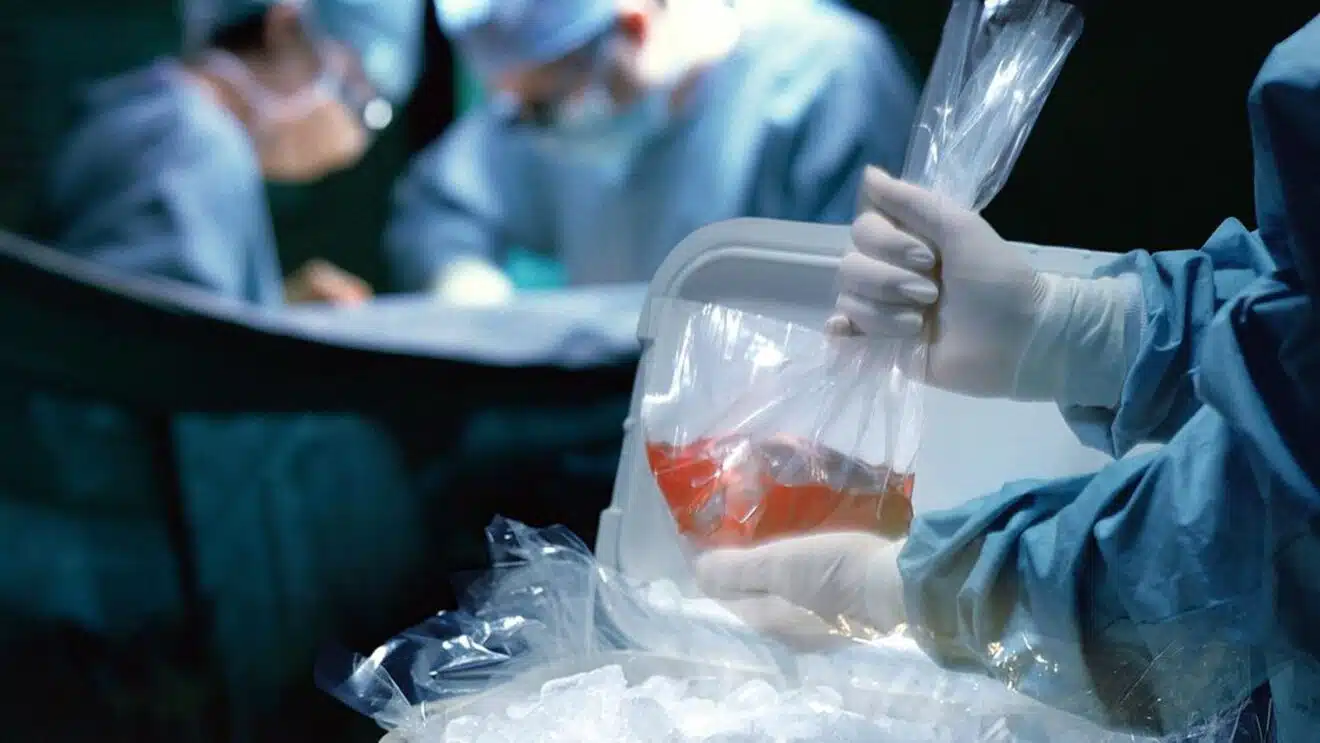
Photo: RT News.
By Slavisa Milacic – Dec 21, 2022
During and after the Kosovo war, accusations were made of people being killed in order to remove their organs to sell them on the black market. Various sources estimated that the number of victims ranged to over 300, which was claimed by Carla del Ponte, a former Swiss attorney general and Chief Prosecutor of two United Nations international criminal law tribunals. The allegations were first publicized by then Chief Prosecutor for the ICTY Carla Del Ponte in her book The Hunt: Me and the War Criminals in 2008.
According to the book, after the end of the war in 1999, Kosovo Albanians were smuggling organs of between 100 and 300 Serbs and other minorities from the Kosovo province to Albania. The perpetrators are said to have strong links to the Kosovo Liberation Army (UÇK). Claims were investigated first by the ICTY who found medical equipment and traces of blood in and around the house in Albania that had allegedly been used as an operating theater to remove the organs.(1)
In 2010, a report by Swiss prosecutor Dick Marty to the Council of Europe (CoE) uncovered “credible, convergent indications” of an illegal trade in human organs going back over a decade, including the deaths of Serb captives killed for this purpose.(2)
Unfortunately, similar things are happening in the Ukrainian conflict. Some of the representatives of the Ukrainian army who ended up in hospitals turn into experimental subjects for testing new medicines. The fate of the seriously wounded can be even worse; at the front, several hundred dollars can be paid for a seriously or mortally wounded person in a field hospital who is ready for organ harvesting. Naturally, Kyiv partially ignored this topic, and partially declared it to be Russian propaganda, but everything is not so simple.
Firstly, it turned out that the Russian media machinery was not up to par during this conflict. Because in the Russian media, the crimes of the Ukrainian army against Russian soldiers that were condemned by the West, the Russian media did not give too much importance. And they always individualized the crimes against Russian soldiers, while even the Western media said that pressure must be put on the Ukrainian General Staff on this matter.
Secondly, regarding this topic, some indirect evidence was unwittingly provided by the Ukrainians themselves. Finally, thirdly, these topics are not new, even Washington admitted that it conducted experiments on the inhabitants of Ukraine in its laboratories, although it declared that he took care of their safety.
Shortly before the war, on December 16, 2021, the Ukrainian Verkhovna Rada passed a law allowing the removal of organs from the dead without notarial consent from them or their official representatives. Moreover, the term “official representative” turns out to be as vague as possible; it may also be the person who undertakes the funeral. In military conditions, it turns out to be the unit commander. After all, in fact, an operation to remove the kidneys from an experienced surgeon takes no more than 15 minutes, and it can well be implemented in the field conditions of a front-line medical center. And such organs as the kidneys are extremely popular goods in the medical market of the USA and Europe. However, in case of actions within the framework of this legal act, transplantologists at least remain in the Ukrainian legal field. Then another question arises – how many organ removals take place officially, and how many not officially?
After all, exactly one year after the adoption of the new procedure for the removal of organs, on December 14, Russian hackers from the Anarchist Kombatant group hacked into the website of the Ukrainian military command and gained access to the lists of 35,382 military personnel of the Armed Forces of Ukraine who are listed as “missing”. At the same time, the data is quite verifiable – on 2000 sheets, with ranks and personal numbers of the missing.
It remains to be assumed that more than 35,000 people were buried, cremated, abandoned on the battlefields without any record. Anyway, 35,000 donor kidneys for the modern world, where their transplantation has long become a routine operation, is a rather small figure that cannot even satisfy the current demand of people who have been standing in line for transplantation for years.
However, let’s be honest, any big war generates significant breakthroughs in medicine. The First World War gave us new methods of treating poisoning and plastic surgery. The second – led to the massive use of antibiotics. Of course, the conflict between Russia and Ukraine also leads not only to a stormy surge of “gray” and “black” transpontology. Hundreds of Ukrainian prisoners who ended up in hospitals in the EU and, first of all, in Germany, receive experimental treatment that allows them to survive, and European doctors to develop new medicines. At the same time, medicine in Europe is very expensive, the treatment of one wounded person can cost 10 or even 100 thousand Euros.
Also the Ukrainian military directly, in numerous programs and publications, stated that they are given “completely new”, “experimental” drugs. That is, they test on them not certified and, in principle, drugs that are not approved for use. On the other hand, perhaps Europe, which has suffered enormous economic losses due to the sanctions war with Russia and assistance to Ukraine, should receive some real bonuses from supporting Ukraine. Organs taken from the dead will save the lives of several thousand Europeans and Americans. But isn’t it immoral to use war for the development of medical science and health care? Every European must answer this question himself.
1. https://www.france24.com/en/20110216-un ... nmik-eulex
2. https://www.theguardian.com/world/2010/ ... ges-kosovo
https://orinocotribune.com/ukrainian-blood-money/
